The Beam
The Beam is the ABR’s bimonthly newsletter. It features important news and updates for each discipline, volunteer spotlights, announcements, and more.
-
December 2025

Photo of a snowy egret by ABR Trustee Daniel C. Davis, MD From the Editor
We Approach Year’s End with Gratitude for ABR People and Processes
By Desiree E. Morgan, MD, ABR Governor
2025;18(6):1
Rounding out the year with insights seems an appropriate way to reflect and to thank all who participate in the ABR’s processes. Exploring oral exam scoring, understanding the ways in which the ABR seeks feedback from stakeholders, highlighting volunteers and the roles they play in the organization, and celebrating the achievements of long-time staff like Anthony Gerdeman, PhD, and volunteers like Mary Mahoney, MD, fills me with gratitude. I hope you’ll take a moment from your busy holiday schedules to benefit from these insights as well.
In this issue …
- From the President: New ABR Vision Statement Highlights Aspirational Foundation
- ABR President Cheri L. Canon, MD; ABR President-elect John A. Kaufman, MD, MS; and ABR Governor Karen Ragland Cole, MD, MBA, announce the ABR’s vision statement and describe how it relates to the organization’s mission.
- From the Board of Governors: DR Oral Certifying Exam Timing Changes to Start in 2028
- ABR Governor James C. Anderson, MD; ABR Governor Desiree E. Morgan, MD; and ABR Executive Director Brent Wagner, MD, MBA, discuss the considerations that prompted the upcoming change in when residents can first sit for the Diagnostic Radiology Oral Certifying Exam.
- From the Board of Trustees: ABR Oral Exam Scoring Processes Reduce Subjectivity
- ABR Associate Director of Psychometrics Ben Babcock, PhD, and the ABR associate executive directors explain how ABR oral exam scoring works and the methods used to increase score standardization.
- Focus on IR/DR: Initial Certification Advisory Committee Provides Valuable Feedback
- ABR Associate Executive Director for Interventional Radiology James B. Spies, MD, MPH, introduces a video in which members of the ABR Interventional Radiology Initial Certification Advisory Committee discuss their involvement with the group.
- Focus on MP: Part I General Qualifying Exam Committee Provides Expertise in Development Process
- ABR Trustees Sameer Tipnis, PhD, and Jennifer Stickel, PhD; ABR Board of Trustees Chair Matthew B. Podgorsak, PhD; and ABR Associate Executive Director for Medical Physics Geoffrey S. Ibbott, PhD, discuss the members and functions of the MP Part I General Qualifying Exam Committee.
- New Perspectives: Small Steps Build Confidence in Radiology Match Journey
- Melissa Lou Silva, MD, discusses her journey from medical school in Brazil to working with the Liver Imaging Group at the University of California San Diego and applying to match into a diagnostic radiology residency in the United States.
- Volunteer Spotlight – DR: He Welcomes AI’s Positive Effects on Radiology
- ABR volunteer Justin Peacock, MD, talked with ABR Communications Manager Rodney Campbell about using AI in diagnostic radiology as a complementary tool in resident education and how there will always be a role for physician involvement in patient diagnosis and treatment.
- Volunteer Spotlight – MP: Down to ‘Only’ One Role, She Remains an Active Volunteer
- Leah Schubert, PhD, has served many roles in her decade as an ABR volunteer, including exam question writer, oral examiner, and chair of the Therapeutic Medical Physics Part 2 Committee.
- ABR Staff Spotlight: Long-Time ABR Psychometrician Anthony Gerdeman Retires
- ABR Associate Director of Exam Services Lydia Warg reviews the career and accomplishments of Anthony Gerdeman, PhD, as he prepares to retire after 29 years with the ABR.
- Announcements: Former ABR Board Member Receives RSNA 2025 Gold Medal
- Mary C. Mahoney, MD, a former ABR Trustee and Governor, has been selected by the Radiological Society of North America as one of three recipients of their 2025 Gold Medal.
- Announcements: Upgraded ABR Website Now Available
- The ABR public website has a new look and enhanced functionality. Let us know what you think at information@theabr.org.
- From the President: New ABR Vision Statement Highlights Aspirational Foundation
-
October 2025

ABR representatives attended the American Society for Radiation Oncology (ASTRO) annual meeting in San Francisco in September. Photo by ABR Communications Director David Laszakovits. From the Editor
Outgoing Board Members Contributed to ABR Process Improvements
By Desiree E. Morgan, MD, ABR Governor
2025;18(5):1
“As we express our gratitude, we must never forget that the highest appreciation is not to utter words, but to live by them.”
— President John F. Kennedy
Every October when the volunteer cycle for Trustees and Governors at the ABR refreshes, I find myself reflecting with gratitude on the legacies of some of our longest serving volunteers. This edition of The Beam shares their contributions and personal reflections with you. All ABR volunteers, but especially these stellar individuals, give generously of their time and subject matter expertise to move forward the activities of the ABR as it strives to meet the goals set forth by the American Board of Medical Specialties (ABMS), of which we are a Member Board. Also pointed out in this edition, the ABR actively considers improvements to its certification programs to be not only consistent with the ABMS standards but also supportive of enhanced value for diplomates and the public. Together with the incredible ABR staff, these dedicated volunteer leaders are critical to enabling necessary improvements to our processes. I hope you’ll join me in thanking them as we welcome new Trustees into their roles.
In this issue …
- From the President: Volunteers Play Crucial Role in Creating Relevant and Appropriate Exams
- ABR President Cheri Canon, MD; ABR Board of Trustees Chair Matthew Podgorsak, PhD; and Executive Director Brent Wagner, MD, MBA, discuss the role of volunteer subject matter experts who define the knowledge domain, create and optimize content, and set the passing standard for the ABR’s qualifying and certifying exams.
- From the Executive Director: ABR Application of ABMS Standards in Continuing Certification Program Enhances Value
- ABR Executive Director Brent Wagner, MD, MBA, and ABR Associate Executive Director for Diagnostic Radiology Mary Newell, MD, explain how the ABR’s Continuing Certification program lines up with standards set in January 2024 by the American Board of Medical Specialties.
- From the Board of Governors: Public Member Role Was an Educational Experience
- ABR Governor Toby Gordon, ScD, looks back on her six years as the first public member of the Board of Governors.
- From the Board of Trustees: Six Trustees Join the ABR Board
- ABR Board of Trustees Chair Matthew Podgorsak, PhD, introduces and welcomes six new members to the Board of Trustees.
- Focus on IR/DR: Trustee Excited to Welcome IR/DR Trustees to Board
- ABR Trustee Anne Covey, MD, reflects on her eight years as a member of the Board of Trustees and the major events that occurred during that time, such as converting to remote exams during COVID.
- Focus on MP: Certification in Additional Medical Physics Specialties
- ABR Associate Executive Director for Medical Physics Geoffrey Ibbott, PhD, and the MP Trustees explain the pathways available for medical physicists who wish to be certified in more than one specialty.
- New Perspectives: Our Three Scholars Look Forward to the Opportunity
- ABR Communications Manager Rodney Campbell speaks to this year’s ABR-sponsored American Board of Medical Specialties Scholars about their aspirations for the program.
- Volunteer Spotlight – IR: No Question He Brought Skills to His Volunteer Assignment
- As an assistant residency program director for interventional radiology at Penn State Hershey Medical Center, Jeffry Cruz, MD, developed skills in question writing that he puts to good use as an ABR volunteer.
- Volunteer Spotlight – RO: His Exam Questions Treat Candidates with No Tricks
- Dan Krauss, MD, an associate professor and section head of brachytherapy at Oakland University William Beaumont School of Medicine and a 13-year ABR volunteer, explains how Initial Certification exams are designed to measure candidates’ knowledge, not foil them with trick questions.
- Announcements: ABR President Receives ACR’s Lawrence R. Muroff Luminary Award
- ABR President Cheri Canon, MD, was recently honored with the 2025 Lawrence R. Muroff Luminary Award from the Radiology Leadership Institute.
- From the President: Volunteers Play Crucial Role in Creating Relevant and Appropriate Exams
-
August 2025

Between a rock wall and a cement driveway, these zinnias found an opportunity to grow and flourish. Photo by ABR Governor and Beam Editor Desiree Morgan, MD. From the Editor
Opportunities Popping Up Everywhere for ABR Stakeholders
By Desiree E. Morgan, MD, ABR Governor
2025;18(4):1
“If opportunity doesn’t knock, build a door.” – Milton Berle
I really like this quote — it’s all about action. At the ABR, some opportunities are known commodities, like volunteering for a question-writing committee for one of our four disciplines. In the pandemic, the “opportunity” to revamp testing to a remote administration took much energy on the part of volunteers and ABR staff. And maybe we weren’t so excited about executing that tremendous pivot, but the processes employed today because of that “opportunity” have enabled a more personalized testing environment for our candidates and diplomates, and more versatility for our volunteers. From creating the Image Quality Committee, providing more paths to certification, and changing the preparation of trainees to heeding the call to volunteer for the ABR at different career junctures, this issue of The Beam is all about opportunities. Enjoy!
In this issue …
- From the Executive Director: ABR Staff and Volunteers Contribute to OLA Relevance and Robustness
- ABR Executive Director Brent Wagner, MD, MBA, discusses the essential role of volunteers and staff in developing and maintaining the relevance and robustness of the Online Longitudinal Assessment (OLA) platform.
- From the Board of Trustees: Committee Puts Emphasis on Image Quality for Exams
- ABR Trustee Daniel C. Davis, MD; Governor Stephen F. Simoneaux, MD; Trustee Brian J. Davis, MD, PhD; Associate Director of Exam Services Lydia Warg; and Director of IT Scott Segal describe how the ABR Image Quality Committee sets standards for image submission and editing to ensure the highest quality for images used on ABR assessments.
- Focus on DR: New Oral Exam Will Change Pedagogy in DR Residencies
- ABR Governor Desiree E. Morgan, MD; ABR Trustee Kate Maturen, MD, MS; and future ABR Trustee Michelle Miller-Thomas, MD, discuss how programs can update their training to prepare residents for the upcoming new DR Oral Exam, how the ABR is engaging with stakeholders through this transition, and call for volunteers to be oral examiners.
- Focus on MP: Alternate Pathway to Board Certification for Foreign-Trained Medical Physicists
- ABR Board of Trustees Chair Matthew B. Podgorsak, PhD; ABR Associate Executive Director for Medical Physics Geoffrey S. Ibbott, PhD; ABR Trustees Kalpana M. Kanal, PhD, and Jennifer Stickel, PhD; and future ABR Trustee Sameer Tipnis, PhD, describe the ABR’s alternate pathway to board certification for medical physicists and physicians trained in foreign countries.
- New Perspectives: Her Pursuit of Radiology Career Was Worth the Wait
- ABR Communications Manager Rodney Campbell talks with interventional radiologist Riddhi Borse, MD, about how she chose her specialty and her experience volunteering with the ABR’s IR Initial Certification Advisory Committee.
- Volunteer Spotlight – DR: Experience Diplomate Doing Her Part to Serve ‘Beautiful Field’
- Arti Gupta, MD, enjoys giving back to her field by using her three decades of experience as a diagnostic radiologist and educator to inform her question writing for the ABR DR Qualifying (Core) Exam.
- Volunteer Spotlight – MP: Longtime Volunteer Ready for New Duties
- After 17 years as an ABR volunteer on Continuing Certification committees, Will Breeden, MS, has switched to Initial Certification, now writing oral exam questions for nuclear medical physicists.
- Announcements: Dr. Yashar Voted in as ASTRO President-elect
- ABR Trustee Catheryn Yashar, MD, was voted president-elect by the membership of the American Society for Radiation Oncology (ASTRO).
- Announcements: Dr. Ibbott Receives AAPM William D. Coolidge Gold Medal
- ABR Associate Executive Director for Medical Physics Geoffrey Ibbott, PhD, was awarded the William D. Coolidge Gold Medal by the American Association of Physicists in Medicine (AAPM).
- Announcements: Dr. Kanal Earns AAPM Lifetime Achievement Award
- ABR Trustee Kalpana Kanal, PhD, was named the recipient of the AAPM’s Edith Quimby Lifetime Achievement Award.
- Announcements: Dr. Stickel Named AAPM Fellow
- ABR Trustee Jennifer Stickel, PhD, was named an AAPM fellow.
- From the Executive Director: ABR Staff and Volunteers Contribute to OLA Relevance and Robustness
-
June 2025

Photo of a bridled titmouse by ABR Trustee Daniel C. Davis, MD From the Editor
Summer’s the Time to Prepare for What’s Coming
By Desiree Morgan, MD, ABR Governor
June 2025;18(3):1
Summer is upon us, and it is a time when our family schedules tend to be more relaxed and easy. For anyone working in an academic medical center, though, we are anything but relaxed and easy, professionally speaking. This season marks the turnover of trainees and their advancement to the next level. As part of the readiness to greet the new academic year, we spend time looking under the hood, so to speak, at the educational program’s procedures and processes. To me, this issue of The Beam feels similar to that readiness renewal mode, and I hope you’ll enjoy reading about some of the ABR’s processes as you anticipate the approach of summer.
In this issue …
- From the Executive Director: ABR Budget and Finance Committee Fulfills Duty of Care
- ABR Secretary-Treasurer Marina I. Feldman, MD, MBA, and ABR Executive Director Brent Wagner, MD, describe how the ABR Board of Governors fulfill their “duty of care” to serve as stewards of the fees collected that support board certification programs and processes.
- From the Board of Governors: International Medical Graduate Alternate Pathway Update
- ABR President Cheri L. Canon, MD, and ABR President-elect John A. Kaufman, MD, MS, describe the details of last month’s announcement that international medical graduates (IMGs) can now combine training from two institutions to fulfill the four years required for the IMG Alternate Pathway.
- From the Board of Trustees: Rigorous Development Processes Ensured Remote Exam Platform Success
- The ABR Associate Executive Directors and the Board of Trustees Chair discuss the roadmap the ABR used to successfully develop and implement a remote exam platform in response to the pandemic in 2020 and our continued commitment to maintaining the consistency, validity, and security of our exams while striving to improve the candidate experience.
- Focus on DR: “That’s a Good Question!”: Recent Inquiries About the New DR Oral Exam
- ABR Associate Executive Director Mary S. Newell, MD; ABR Trustee Kate Maturen, MD, MS; and ABR Governors Desiree E. Morgan, MD, and Stephen F. Simoneaux, MD, answer common questions about the new DR Oral Exam.
- Focus on IR/DR: Understanding the Prerequisites for the Interventional Radiology International Medical Graduate Alternate Pathway
- ABR Associate Executive Director for Interventional Radiology James B. Spies, MD, MPH, explains how the International Medical Graduate (IMG) Alternate Pathway for IR/DR candidates differs from that for diagnostic radiology candidates, and describes the new two-year IR IMG pathway.
- Focus on MP: Frequently Asked Questions About OLA Scoring
- ABR Trustee Kalpana M. Kanal, PhD; ABR Associate Director of Psychometrics Ben Babcock, PhD; ABR Associate Executive Director for Medial Physics Geoffrey S. Ibbott, PhD; and ABR Board of Trustees Chair Matthew B. Podgorsak, PhD, present a subset of questions and answers from a recent presentation at the American Association of Physicists in Medicine (AAPM) about Online Longitudinal Assessment (OLA) scoring.
- New Perspectives: Anxiety Becomes Excitement on Match Day for New Resident
- Future diagnostic radiology resident Garrett Barfoot, MD, describes the wide range of emotions he experienced on Match Day this year.
- Volunteer Spotlight – IR: Fairness Is on Her Mind When She Writes Exam Questions
- Interventional radiologist Divya Kumari, MD, uses her experience teaching in a diagnostic radiology department and doing clinical work at a hospital with a diverse population to inform her question writing for ABR exams.
- Volunteer Spotlight – RO: He Always Looks on the Bright Side of Life
- ABR Communications Manager Rodney Campbell spoke to radiation oncologist Jamie Cesaretti, MD, about the importance of optimism in his career and in his work as a long-time question writer and oral examiner for the ABR.
- Continuing Certification Update: Formative Elements of Online Longitudinal Assessment (OLA)
- ABR Communications Director David Laszakovits, MBA, and ABR Associate Executive Director for Diagnostic Radiology Mary S. Newell, MD, describe the formative element of Online Longitudinal Assessment (OLA).
- From the Executive Director: ABR Budget and Finance Committee Fulfills Duty of Care
-
April 2025

Savannah, Georgia, photo by ABR Associate Executive Director for Radiation Oncology Michael Yunes, MD From the Editor
Changes We Can Embrace
By Desiree Morgan, MD, ABR Governor
April 2025;18(2):1
Early spring is my favorite season. In my part of the world, daffodils, hyacinths, and now irises are blooming, the redbuds are finishing their showy fuchsia, dogwoods are opening, and from elms to oaks, the big trees are in bud. Spring signals a change that we can count on, one that we welcome (allergies aside!). Not all change is as embraceable, but when it is carefully explained, the prickly feeling we tend to get when we are told “change is coming” is easier to process. This edition of The Beam explains changes coming to the IR/DR certifying exam process, a new pathway toward pediatric radiology certification, and refinement of the ABR’s strategic priorities, in addition to introducing you to volunteers, new perspectives, and more of our processes, as we typically do. I hope you enjoy learning more, and I wish you abundant beauty this spring!
In this issue …
- From the President: Collaboration, Improvement, and Innovation Added to BOG’s Strategic Priorities
- ABR President Cheri L. Canon, MD, and ABR Executive Director Brent Wagner, MD, MBA, describe two new strategic priorities: proactively collaborating with professional organizations and creating a culture of improvement and innovation.
- From the Board of Trustees: Seven Volunteers Joining Board of Trustees
- The ABR Board of Trustees will be adding seven members this year: three in diagnostic radiology (pediatric radiology, cardiothoracic imaging, and neuroradiology), two in interventional radiology/diagnostic radiology, one in radiation oncology, and one in diagnostic medical physics.
- Focus on DR: New 15-Month Pathway Offers Flexibility for Pediatric Radiology Training and Certification
- ABR Governor Stephen F. Simoneaux, MD, and ABR Executive Director Brent Wagner, MD, MBA, announce a 15-month pathway to pediatric subspecialty certification.
- Focus on IR/DR: New Interventional Radiology/Diagnostic Radiology (IR/DR) Certifying Exam Process
- ABR President Cheri L. Canon, MD, and ABR President-elect John A. Kaufman, MD, MS, discuss how stakeholder input informed the decision to change the Interventional Radiology/Diagnostic Radiology Certifying Exam process.
- Focus on MP: Volunteers Drive the ABR’s Work
- ABR Associate Executive Director for Medical Physics Geoffrey S. Ibbott, PhD, describes the application process for becoming a medical physics volunteer and the important work volunteers do to prepare, evaluate, and administer ABR exams.
- Focus on RO: Unsealed Sources, Radiopharmaceuticals, and Theranostics in Radiation Oncology Exams
- ABR Associate Executive Director for Radiation Oncology Michael Yunes, MD, announces that future ABR Radiation Oncology Qualifying and Certifying exams will contain more content on unsealed sources.
- New Perspectives: Interprofessional Community Clinic Offers Medical Students Early Exposure to Radiology
- Third-year medical students Zach Cherian and Adam El Hendy Gunnarsson discuss how they gained valuable experience by participating on a radiology panel at the Rosalind Franklin University Interprofessional Community Clinic.
- Volunteer Spotlight – DR: Her Shift to a ‘Day Job’ Took Years of Work
- ABR Communications Manager Rodney Campbell talks with ABR volunteer Adina Alazraki, MD, about her career switch from urgent care pediatrician to diagnostic radiologist.
- Volunteer Spotlight – MP: She Knocked Down Roadblocks to Navigate Her Medical Physics Route
- After overcoming roadblocks in her educational journey, Alisa Walz-Flannigan, PhD, an ABR medical physics oral examiner, now creates opportunities for other women to thrive in a male-dominated field.
- Continuing Certification Update: OLA Scoring Provides Accurate Representation of Diplomates’ Knowledge
- ABR Associate Director of Assessment Research and Strategy Brooke Houck, PhD, explains the scoring formula for evaluating a diplomate’s performance on Online Longitudinal Assessment (OLA).
- Announcements: Dr. Morgan Receives Society of Abdominal Radiology Gold Medal
- As a fellow and past president of the Society of Abdominal Imaging (SAR), I was honored to be one of three recipients of the SAR Gold Medal this year.
- From the President: Collaboration, Improvement, and Innovation Added to BOG’s Strategic Priorities
-
February 2025

ABR CFO Svetlana Pitman captured these two greater roadrunners sharing a grub from her patio in Tucson, Arizona. From the Editor
Ongoing Evolution of Certification Instruments Leads to New DR Oral Exam
By Desiree Morgan, MD, ABR Governor
February 2025;18(1):1
It is remarkable to me that over 12 million questions have been answered by ABR diplomates in the five years that Online Longitudinal Assessment (OLA) for Continuing Certification has been employed. The major upheaval in operations and infrastructure that the OLA program demanded of the ABR is mirrored in the activity that is going on now behind the scenes to bring on the New Diagnostic Radiology Oral Exam. Scheduled to begin in 2028, it will be remotely administered like the certifying exams of the three other ABR disciplines, and its resurgence in a new form is a testament to the ongoing evolution of certification instruments as our disciplines and practices evolve. I hope you enjoy reading different perspectives pertaining to the new DR Oral Exam — from the priorities of our newest members of the Board of Governors to the inspiration and impact on our volunteers, the oral certifying exam process is at the forefront of the minds of many.
In this issue …
- From the President: Attending In-Person Society Meetings Creates Better Connections with Stakeholders
- ABR President Cheri L. Canon, MD; Administrative and Exam Support Manager Kinsey SmithWright; and Communications Director David Laszakovits, MBA, discuss the benefits of ABR representatives attending major professional society meetings to connect in person with stakeholders.
- From the Executive Director: Remote Exam Security Ensures Fair Representation of Candidates’ Knowledge
- ABR Executive Director Brent Wagner, MD, MBA, describes how remote exam security guarantees a fair assessment of examinees’ knowledge and skills.
- From the Board of Governors: New Governors Share First Impressions
- A few months after joining the ABR Board of Governors, James C. Anderson, MD, Stephen F. Simoneaux, MD, and Karen Ragland Cole, MD, share thoughts on their new volunteer roles.
- From the Board of Trustees: Oral Exam Format Highly Valuable for Assessing Candidates
- As the ABR prepares for the return of the Diagnostic Radiology Oral Exam in 2028, ABR Board of Trustees Chair Matthew B. Podgorsak, PhD, and Executive Director Brent Wagner, MD, MBA, explain the value of the oral exam format for testing candidates’ application of knowledge, analysis, and evaluation.
- Focus on DR: ABR Trustee Follows Mentors to Leadership Role on Board
- ABR Trustee Kate Maturen, MD, talks about her early days as an ABR volunteer and the mentors who encouraged her along the way to her current role as vice chair for diagnostic radiology.
- Focus on IR/DR: Stakeholders Weigh in on IR/DR Certification Model
- ABR President-elect John A. Kaufman, MD, MS; Associate Executive Director for Interventional Radiology James B. Spies, MD, MPH; and Executive Director Brent Wagner, MD, MBA, explain the process by which the ABR has opened channels for stakeholders to comment on whether the current certification process for interventional radiologists is equivalent to diagnostic radiology certification.
- Focus on MP: Diagnostic Medical Physics Qualifying Exam Committee’s Expertise Results in Fair and Relevant Exams
- ABR Trustee Kalpana M. Kanal, PhD, explains the roles and functions of ABR volunteer item-writing committees, with a focus on the Diagnostic Medical Physics Part 2 Qualifying Exam Committee.
- Focus on RO: New Oral Examiner Event Offers Enhanced Mentorship and Training
- ABR Associate Executive Director for Radiation Oncology Michael Yunes, MD, announces a pilot mentorship and training program to be held this spring in Dallas for RO oral examiners.
- New Perspectives: Change of Plans Sends Aspiring Resident Down VIR Path
- While he was studying to be a surgeon, a personal experience with a vascular and interventional radiology procedure led medical student Armaan Mazra, MS, to change his plans and pursue a career in radiology instead.
-
Volunteer Spotlight – IR: Johns Hopkins Job and Baltimore Sports Make Volunteer a Happy Marylander - A combination of academic and clinical work makes ABR volunteer Brian Holly, MD, a perfect fit for the IR/DR Qualifying (Core) Exam item-writing committee.
- Volunteer Spotlight – RO: After Considering Oceanography, She’s Making a Splash in Radiation Oncology
- For Katherine Tzou, MD, an ABR volunteer since 2017, writing items for the Radiation Oncology Qualifying Exam and serving as an oral examiner allows her to give back to the profession and learn from her colleagues, which in turn makes her a better physician.
- In Memoriam: Remembering Former ABR President Lee Rogers, MD
- We remember former ABR President Lee F. Rogers, MD, a distinguished musculoskeletal radiologist and educator who was instrumental in the adoption of ABR subspecialty certification in pediatric radiology, neuroradiology, and vascular and interventional radiology in the early 1990s.
- Continuing Certification Update: OLA Tips and Reminders for 2025
- ABR Communications Director David Laszakovits, MBA, and Executive Director Brent Wagner, MD, offer important reminders for OLA participants.
- Announcements: Trustee Elected to RSNA Board as Liaison for Public Information and Professionalism
- Congratulations to ABR Trustee Anne M. Covey, MD, who has been elected as the RSNA Board Liaison for Public Information and Professionalism.
- Announcements: Trustee Receives AAPM Lifetime Achievement Award
- Congratulations to ABR Trustee Kalpana Kanal, PhD, who recently received a Lifetime Achievement Award from the Upstate New York Chapter of the American Association of Physicists in Medicine.
- From the President: Attending In-Person Society Meetings Creates Better Connections with Stakeholders
-
December 2024

Hepatic tanager photographed by ABR Trustee Daniel C. Davis, MD, in Madera Canyon, Arizona. From the Editor
Updates to Assessments and Study Materials Coming in New Year
By Desiree Morgan, MD, ABR Governor
December 2024;17(6):1
As the year wraps up and we spend time sending glad tidings and gathering with family and friends, I pause to wish you all the best for 2025. The ABR is focused on activities geared toward welcoming the new year and the next cycles of certification. We are excited to share upcoming changes to exams and preparatory materials across the four disciplines for next year, as well as introduce you to more of our volunteers who help forward the ABR’s mission throughout the seasons.
In this Issue …
- From the President: Avoiding Conflicts of Interest Keeps Exams Fair and Relevant
- ABR President Cheri L. Canon, MD, and Executive Director Brent Wagner, MD, MBA, discuss how the board’s conflict of interest policy for volunteers helps maintain the integrity of the assessment process.
- From the Executive Director: ABR Methods and Motives Explained in Q&A with Executive Director
- ABR Executive Director Brent Wagner, MD, MBA, answers common questions from candidates and diplomates about ABR processes and procedures and explains the motives behind the board’s construct and actions.
- From the Board of Trustees: New Trustees Share First Impressions
- A few months after joining the ABR Board of Trustees, Kristopher Cummings, MD; Umesh D. Oza, MD; Kenneth Rosenzweig, MD; and Jennifer Stickel, PhD, share thoughts on their new roles.
- Focus on DR and IR/DR: Expanded Radioisotope Safety Content Study Guide Coming Soon
- ABR Trustee Umesh D. Oza, MD, and Ephraim E. Parent, MD, PhD, announce that an expanded Radioisotope Safety Content Study Guide will soon be available on the ABR website.
- Focus on MP: ABR Updating OLA Process for NMP Diplomates in 2025
- ABR Trustee Jennifer R. Stickel, PhD, describes updates coming next year to improve the Online Longitudinal Assessment (OLA) process for nuclear medical physics diplomates.
- Focus on RO: RO Qualifying Exam To Increase Coverage of Benign Diseases
- ABR Associate Executive Director of Radiation Oncology Michael Yunes, MD, reports that benign diseases will have greater representation in the 2025 Qualifying Clinical Exam and that cases from this subset will start being added to the Oral Certifying Exam in 2026.
- New Perspectives: Future Resident Staying Busy in Her Year Away From Studies
- Future radiology resident Annelise M. Silva, MD, EdM, talked with ABR Communications Manager Rodney Campbell about her quick transition from completing medical school to being the national president of the American Medical Student Association (AMSA).
- Volunteer Spotlight – DR: Volunteer Goes From Fresh Out of Training to ‘Amazing’
- ABR volunteer Ryan Avery, MD, uses his interactions with residents to inform his question writing for the Diagnostic Radiology Nuclear Radiology Subspecialty Committee and his work on the committee to help him stay current with advancements in practice.
- Volunteer Spotlight – MP: New Oral Examiner Drawing on Her PhD Experience
- Studying oral exam methodology while earning a doctorate in education helped ABR volunteer Ashley Cetnar, PhD, prepare for her role as an oral examiner for medical physics.
- Announcements: Trustee Receives Yale Distinguished Clinical Career Award
- ABR Trustee Leslie Scoutt, MD, was recently honored with a Distinguished Clinical Career Award from the Yale School of Medicine, where she is professor of radiology and biomedical imaging and medical director of the Non-Invasive Vascular Laboratory.
- Announcements: To Get Important Updates, Keep Contact Information Current
- Remember to keep your contact information up to date in myABR to ensure that you receive important announcements from the ABR.
- From the President: Avoiding Conflicts of Interest Keeps Exams Fair and Relevant
-
October 2024

Rufous hummingbird photographed by ABR Trustee Daniel C. Davis, MD From the Editor
Stakeholder Feedback Continues to Drive ABR Decisions
By Desiree Morgan, MD, ABR Governor
October 2024;17(5):1
“Courage is what it takes to stand up and speak; courage is also what it takes to sit down and listen.”
– Winston Churchill
Listening is so important, and I challenge all of us to do more of it in this season and beyond. You will find multiple references in this edition of The Beam where we describe the courage of stakeholders, whether that of our Initial and Continuing Certification Advisory Committee members or that of the various stakeholder groups who have provided the ABR with their thoughts and opinions on our processes and assessment instruments over the past several years. All are highly valued by the ABR, and we are listening.
In this issue …
- From the President: Q&A With New ABR President Cheri L. Canon, MD
- Cheri L. Canon, MD, who started her term as ABR president last month, answers questions about her new role.
- From the Executive Director: Board of Governors and Board of Trustees Work With Staff and Volunteers To Fulfill the ABR’s Mission
- ABR Executive Director Brent Wagner, MD, MBA, provides an interactive organization chart illustrating how the Board of Governors and Board of Trustees interact with each other, volunteers, and staff.
- From the Board of Governors: ABR Seeks Public Member for Board of Governors
- ABR President Cheri L. Canon, MD, and ABR President-elect John A. Kaufman, MD, MS, announce an opening for a public member on the ABR Board of Governors and describe the qualifications for this role.
- From the Board of Trustees: Call for Nominations for ABR Board of Trustees
- ABR Board of Trustees Chair Matthew B. Podgorsak, PhD, calls for nominations for six open positions on the Board of Trustees.
- Focus on DR: New DR Oral Exam Builds on Previous Model with Scoring Rubrics
- ABR Governors Stephen F. Simoneaux, MD, and Desiree E. Morgan, MD; ABR Associate Executive Director for Diagnostic Radiology Mary S. Newell, MD; and ABR Executive Director Brent Wagner, MD, MBA, discuss scoring rubrics for the new DR Oral Exam coming in 2028.
- Focus on IR/DR: OLA Allows Interventional Radiologists to Align Content With Practice
- ABR Associate Executive Director for Interventional Radiology James B. Spies, MD, MPH, and ABR President-elect John A. Kaufman, MD, MS, describe how Online Longitudinal Assessment (OLA) benefits IR diplomates by allowing them to align content with their practice profile.
- Focus on MP: Medical Physics Trustees Welcome Dr. Jennifer Stickel
- Former ABR Trustee Robert A. Pooley, PhD; ABR Trustee Kalpana M. Kanal, PhD; ABR Board of Trustees Chair Matthew B. Podgorsak, PhD; and ABR Associate Executive Director for Medical Physics Geoffrey S. Ibbott, PhD, welcome new ABR Nuclear Medical Physics Trustee Jennifer R. Stickel, PhD.
- Focus on RO: ABR Volunteers and Advisory Committee Members Represent the Interests of the Profession and the Patients We Serve
- ABR Trustee Catheryn Yashar, MD, and ABR Communications Director David Laszakovits, MBA, explain how volunteers and Continuing Certification Advisory Committee members help ensure that diplomates’ voices are heard and their concerns addressed.
- New Perspectives: New Residents Excited to Start Their Training Days
- ABR Communications Manager Rodney Campbell spoke with six new diagnostic and interventional radiology residents about their expectations for their residencies and their experiences so far.
- Volunteer Spotlight – IR: Volunteer’s ‘Unique Perspective’ Makes Him Valuable for Several Committees
- Interventional radiologist Ezana Azene, MD, talked with ABR Communications Manager Rodney Campbell about the rewards of volunteering as an oral examiner, question writer, and member of the IR Continuing Certification Advisory Committee.
- Volunteer Spotlight – RO: Drawing on Her Days as a Candidate Makes Her a Better Examiner
- ABR Communications Manager Rodney Campbell interviewed radiation oncologist Malika Siker, MD, who draws from multiple sources, including her own experience as a candidate, to inform her volunteer work as an ABR oral examiner and question writer.
- Breast Cancer Awareness Month: Breast Cancer Awareness Month Participants Address Disparities in Health Care
- Breast Cancer Awareness Month provides an opportunity for physicians like Tomo Omofoye, MD, Pauline Germaine, DO, and Amy K. Patel, MD, to connect with patients from diverse communities, raise awareness of the disparities in healthcare coverage, and improve access to care in underserved populations.
- Announcements: New ABR Board Members Announced
- At the end of the ABR board meeting in September, two volunteers joined the ABR Board of Governors and four started their first term on the Board of Trustees.
- Announcements: Dr Borgstede Awarded 2024 RSNA Gold Medal
- Congratulations to former ABR President James P. Borgstede, MD, on being awarded a Gold Medal from the Radiological Society of North America (RSNA).
- From the President: Q&A With New ABR President Cheri L. Canon, MD
-
August 2024

Photo by Katrina Rochon From the Editor
ABR Volunteer Roles Change With the Seasons
By Desiree Morgan, MD, ABR Governor
August 2024;17(4):1
As summer spirals toward fall, I hope you are refreshed by the more laid-back pace of life that warmer weather tends to bring. The dependable change in seasons is mirrored in the activities of the ABR, where in August we prepare for upcoming transitions in item-writing cycles, committee rosters, and leadership, as well as new projects for improvement of our certification processes. I pause to reflect with gratitude on the work of our volunteers who will rotate from their roles with us, and I am thankful for their enthusiastic support of our shared mission.
In this issue …
- From the President: Q&A with ABR Leadership: Reflections on Seven Years on Board of Governors
- Outgoing ABR President Robert M. Barr, MD, looks back on his seven years on the ABR Board of Governors, and discusses, among other topics, the organization’s biggest challenges and accomplishments during his tenure.
- From the Executive Director: ABR To Gather Stakeholder Input on IR/DR Certification Exam Structure
- ABR Secretary-Treasurer John A. Kaufman, MD, MS; ABR President-elect Cheri L. Canon, MD; and ABR Executive Director Brent Wagner, MD, MBA, announce plans for a multifaceted process of stakeholder engagement to gather input about the IR/DR certification exam structure.
- From the Board of Governors: Overlapping Roles of the ABR and Residency Programs Support High-Qualify Patient Care
- ABR Governor Donald J. Flemming, MD; ABR Board of Trustees Chair Matthew B. Podgorsak, PhD; and ABR Executive Director Brent Wagner, MD, MBA, explain how residency programs’ structured training and the ABR’s development and administration of standardized exams work together to create a fair and meaningful certification process that benefits patients.
- Focus on DR: It’s a Success! Update on the ABR 16-Month Pathway in Nuclear Radiology
- ABR Trustee M. Elizabeth Oates, MD, and ABR Communications Director David Laszakovits, MBA, describe growing interest in the ABR’s 16-month pathway in nuclear radiology (NR) for attaining primary certification in diagnostic radiology or interventional radiology/diagnostic radiology and subspecialty certification in NR.
- Focus on IR/DR: Addressing the Independent IR Residency Trainee Gap
- ABR Associate Executive Director for Interventional Radiology James B. Spies, MD, reports that an increase in applicants for integrated IR residencies has led to a decrease in residents applying for independent IR residencies and discusses how modifications in the international medical graduate (IMG) pathway could allow IMGs to fill open positions while also making progress toward certification.
- Focus on MP: Meeting Continuing Certification Requirements: Assessment Timeline
- ABR Board of Trustees Chair Matthew B. Podgorsak, MD, et al. discuss the ABR’s process and timeline for evaluating if diplomates are meeting their Continuing Certification requirements.
- New Perspectives: Early Career Radiation Oncologists Stay Busy as Volunteers
- ABR Communications Manager Rodney Campbell interviews residents Michael LeCompte, MD, and Joy Ogunmuyiwa, MD, members of the ABR’s Radiation Oncology Initial Certification Advisory Committee, about the benefits of volunteering to expand their experiences and help other early-career physicians.
- Volunteer Spotlight – DR: No ‘Evil Scientist,’ He Works to Make Exams Fair and Relevant
- Diagnostic radiologist Ken Buckwalter, MD, MBA, talks with ABR Communications Manager Rodney Campbell about his 15 years as an ABR oral examiner and question writer and the effort volunteer committees invest into writing relevant exam items.
- Volunteer Spotlight – MP: Exam Curiosity Inspired Him to Become Volunteer
- ABR Communications Manager Rodney Campbell shares how curiosity about the exam development process and a desire to make it better led medical physicist Richard Castillo, PhD, to become an ABR volunteer and oral examiner.
- Announcements: ABR President-elect Canon Named Professor Emerita at UAB
- Congratulations to ABR President-elect Cheri L. Canon, MD, on being named professor emerita at the University of Alabama at Birmingham.
- Announcements: Nine ABR Volunteers Name AAPM Fellows
- Congratulations to the nine ABR medical physics volunteers who became Fellows of the American Association of Physicists in Medicine (AAPM).
- From the President: Q&A with ABR Leadership: Reflections on Seven Years on Board of Governors
-
June 2024

ABR Trustee Daniel C. Davis, MD, captured this image of the total eclipse on April 8, 2024, in Carbondale, Illinois. From the Editor
Nothing Can Eclipse Our Story Lineup This Issue
By Desiree Morgan, MD, ABR Governor
June 2024;17(3):1
What a spectacular photo of the recent eclipse! Thanks to Trustee Dan Davis for sharing his amazing capture of this rare and awe-inspiring natural phenomenon. With summer just around the corner, I hope that each of you gets out in nature to witness things great and small. Before your summer adventures with family and friends, I invite you to take a moment to check out what is happening at the ABR.
In this issue …
- From the President: ABR’s Two Governing Bodies Direct and Support the Mission, Volunteers, and Staff
- ABR President Robert M. Barr, MD, explains how the Board of Governors and the Board of Trustees support staff and volunteers in fulfilling the ABR’s mission and describes the qualifications of the diverse set of individuals who make up these two distinct bodies.
- From the Executive Director: ABR Customer Service Provides Targeted Solutions to Certification Questions
- ABR Executive Director Brent Wagner, MD, MBA, applauds the ABR’s certification managers, who take pride in listening to candidates and diplomates and providing specific, workable solutions to their customer service issues. He also discusses upcoming enhancements that will make myABR a more personalized interface.
- From the Board of Governors: ABR Presentation at Association of University Radiologists Meeting Highlights New DR Oral Exam
- ABR President-elect Cheri L. Canon, MD, and I review highlights from the ABR’s presentations and activities at the annual meeting of the Association of University Radiologists (now the Association of Academic Radiology), including an overview of the new DR Oral Certifying Exam, increased interest in the International Medical Graduate (IMG) Alternate Pathway, a summary of participation in the 16 month Nuclear Radiology subspecialty certification pathway, and continued high participation in Online Longitudinal Assessment (OLA).
- From the Board of Trustees: DEI Training Helps Optimize the Oral Exam Experience
- ABR trustees Kalpana M. Kanal, PhD, and Paul J. Rochon, MD, provide an update on diversity, equity, and inclusion training for oral examiners, a pilot of which was employed for the recent Medical Physics Oral Certifying Exam.
- Focus on DR: Advisory Committee Feedback Improves Communication Between ABR and Trainees
- ABR Communications Director David Laszakovits joins me in describing how the Diagnostic Radiology Initial Certification Advisory Committee helps improve communication between the ABR and trainees.
- Focus on IR/DR: Change in the Timing of the IR/DR Oral Certifying Exam
- ABR Associate Executive Director for Interventional Radiology James B. Spies, MD, explains the reasoning behind the decision to change the timing of the oral component of the IR/DR Certifying Exam from the fall after residents graduate to the following spring.
- Focus on MP: TMP Qualifying Exam Committee Supports ABR Mission
- ABR Board of Trustees Chair Matthew B. Podgorsak, PhD; MP trustees Kalpana M. Kanal, PhD, and Robert A. Pooley, PhD; future MP Trustee Jennifer Stickel, PhD; and ABR Associate Executive Director for Medical Physics Geoffrey S. Ibbott, PhD, describe how MP exam committees function and spotlight the work of the Therapeutic Medical Physics Committee.
- Focus on RO: Volunteering With the ABR Allows Radiation Oncologists to Give Back
- ABR Associate Executive Director for Radiation Oncology Michael Yunes, MD, discusses the importance of volunteers in supporting the ABR’s mission, extols the benefits of getting involved, and describes the ABR volunteer application process.
- New Perspectives: Visiting Scholars Finding Program ‘Enriching,’ ‘Engaging’
- The three current ABR Visiting Scholars – Leslie Chang, MD, Francis Deng, MD, and Ria Mulherkar, MD – provide updates on their research projects and discuss what they have gained from the experience.
- Volunteer Spotlight – IR: ‘Black Box’ Curiosity Led Him to Become ABR Volunteer
- ABR Communications Manager Rodney Campbell talks with ABR volunteer Brian Funaki, MD, who appreciates the rigor of the exam development process now that he has seen inside the “Black Box” and enjoys his role as a question writer and oral examiner in helping the exams be fair and reflective of an interventional radiologist’s real world experience.
- Volunteer Spotlight – RO: Laughter Lightens the Challenge of Writing Exam Questions
- Radiation oncologist and ABR volunteer Christine Eyler, MD, speaks with ABR Communications Manager Rodney Campbell about the challenges, and unexpected fun, of developing radiation biology questions with the other members of the Biology and Physics Qualifying Exam Committee.
- Continuing Certification Update: Diplomates Prefer OLA for Part 3 Continuing Certification Requirement
- In a video and short introduction, ABR Executive Director Brent Wagner, MD, MBA, explains why a majority of ABR diplomates prefer Online Longitudinal Assessment (OLA) over a point-in-time exam to satisfy the Part 3 requirement of Continuing Certification.
- In Memoriam: William J. Casarella, MD, DABR, FACR, FSIR (11/17/1937 – 02/02/2024)
- Former ABR Executive Director Gary J. Becker, MD, honors the memory of William J. Casarella, MD, a world-renowned interventional radiologist who led the ABR as president of the Board of Trustees from 1998-2000.
- Announcements: Radiation Oncologist Named to ABR Board of Trustees
- Radiation oncologist Kenneth Rosenzweig, MD, will be joining the ABR’s Board of Trustees at the end of the board meeting in September.
- From the President: ABR’s Two Governing Bodies Direct and Support the Mission, Volunteers, and Staff
-
April 2024

Photo by Katrina Rochon From the Editor
We’re Springing Into a Busy Season
By Desiree Morgan, MD, ABR Governor
April 2024;17(2):1
Spring is a time for change and rejuvenation, for welcoming longer periods of light, and for partaking in the beauty all around as winter recedes. It’s my favorite season.
For ABR volunteers and staff, it is a busy time of exam content generation, organization, and administration. These important activities hit a crescendo just as our work and family lives hectically accelerate toward summer. At the ABR, we are truly grateful for our dedicated volunteers, and I hope you enjoy learning about the people and processes behind our collective certification efforts.
In this issue …
- From the President: Assessment of Knowledge and Skills: Advantages of OLA
- ABR President Robert M. Barr, MD; ABR Executive Director Brent Wagner, MD, MBA; and ABR Psychometrician Brooke Houck, PhD, describe how the ABR offers two methods for diplomates to demonstrate that they “have the knowledge, clinical judgment, and skills to practice safely and effectively in the specialty,” also known as “Part 3” of the Continuing Certification program. Learn more about how Online Longitudinal Assessment provides a customized experience aligned with one’s scope of practice, while the Continuing Certification Exam measures a broader set of knowledge and skills less tailored to the individual radiologic professional.
- From the Executive Director: Complex Question Development Process Limits Number of Exam Administrations Per Year
- ABR trustees Kalpana M. Kanal, PhD, and Brian J. Davis, MD, PhD, join ABR Executive Director Brent Wagner, MD, MBA, in explaining why the ABR offers two exam administrations annually for the oral certifying exams in medical physics, radiation oncology, and interventional radiology but only one administration per year for computer-based exams.
- From the Board of Governors: AI/ChatGPT Will Not Be Used To Generate OLA or Exam Content
- ABR Executive Director Brent Wagner, MD, MBA, and ABR Board of Trustees Chair Matthew B. Podgorsak, PhD, explain why generative artificial intelligence/ChatGPT will not be used to produce Online Longitudinal Assessment (OLA) questions or any ABR exam content. Be sure to click on the link to Dr. Podgorsak’s video on the topic to learn more.
- From the Board of Trustees: Survey Shows Volunteers Overwhelmingly Value Their ABR Experience
- ABR trustees Pamela A. Propeck, MD, and M. Elizabeth Oates, MD, and ABR Governor Andrea K. Ng, MD, MPH, share results from a recent survey of approximately 1,300 ABR volunteers to understand where they find value in their service to the ABR mission and how they are challenged. ABR leadership and staff are deeply grateful for our volunteers’ commitment and enthusiastic service, and we continually strive to improve the volunteer experience.
- Focus on DR: He’s Moved From Taking Exams to Making Them
- ABR Communications Manager Rodney Campbell talked with Derek Johnson, MD, an ABR volunteer from the Mayo Clinic, Rochester, who writes questions for two exams: IR/DR Certifying and Nuclear Radiology Subspecialty. Learn how he made his way from personal certification by the American Board of Psychiatry and Neurology as a practicing neuro-oncologist in 2009 to his current career after ABR certification in diagnostic radiology, neuroradiology, and his true passion, nuclear radiology.
- Focus on IR/DR: Kaufman Named President-elect for Board of Governors
- Interventional radiologist John A. Kaufman, MD, MS, has been named president-elect of the ABR Board of Governors. Learn Dr. Kaufman’s history and listen as he shares his vision of what makes a good ABR president in the video accompanying the article.
- Focus on MP and RO: Resource Allocation in Radiation Oncology: Where We’ve Been, Where We’re Going
- Navneeth Hariharan, ME, an ABR MP diplomate and volunteer, explains the interconnected dynamics of the rapidly evolving technical complexity in radiation oncology coupled with advancements in clinical practice that require more tasks related to personalized treatment planning and staffing challenges. He sets this against the backdrop of resource allocation optimization and the value of dedicating scheduled time for reflection and learning amidst the busy routine workdays of clinical medical physicists.
- New Perspectives: Urology Resident Finds It’s Never Too Late to Switch to Radiology
- Meet Parris Diaz, MD, who serves as a urology resident at the University of California at San Francisco but plans to enter the field of radiology during the next NRMP match cycle.
- Volunteer Spotlight: No Longer ‘All Over the Map,’ Her Exam Questions Are Now on Point
- ABR Communications Manager Rodney Campbell introduces us to volunteer Elizabeth (Beth) Bossart, PhD, an associate professor of clinical radiation oncology at the University of Miami’s Miller School of Medicine. She describes her learning trajectory developing therapeutic medical physics questions and shares how this work helps her in the classroom. In addition, serving as an oral examiner in 2021 has enabled her to better understand the preparation residents need to be successful.
- Announcements: Board of Trustees to Welcome Three Members After Fall Meeting
- The Board of Trustees will welcome three members in October 2024. Meet the newest trustees: Kristopher Cummings, MD, a cardiothoracic radiologist; Umesh D. Oza, MD, a nuclear radiologist; and Jennifer Stickel, PhD, a nuclear medical physicist.
- From the President: Assessment of Knowledge and Skills: Advantages of OLA
-
February 2024

Sandhill cranes in Willcox, Arizona, photographed by ABR Communications Coordinator Heather Hopkins. From the Editor
Reflection, Review, and Reorganization Key to Improvement
By Desiree Morgan, MD, ABR Governor
February 2024;17(1):1
With the turn of the calendar year, many of us reflect on processes, make priorities, and expend effort towards organization or reorganization, both at home and at work. The ABR is no different! In this issue of The Beam, we see examples of process review and continual efforts by our volunteers to improve our certification exams, in keeping with our collective quest and mission to serve the public. I hope you enjoy learning more about it!
In this issue …
- From the President: The Value of Diplomate Feedback in OLA
- ABR President Robert M. Barr, MD; ABR Associate Executive Director for Diagnostic Radiology Mary S. Newell, MD; and ABR Exam Development Manager Jennifer Knoll describe the unique mechanism for feedback found in the OLA system. Designed to allow candidates the opportunity to provide insights, voice concerns, and highlight alternative interpretations regarding answers to the questions in real time, these comments are combined with psychometric performance metrics analysis and, when flagged for potential problems, are reviewed by the associate executive directors and OLA item-writing committees for improvement.
- From the Executive Director: New Year Kicks Off Period of Project Refinement
- ABR Executive Director Brent Wagner, MD, MBA, and ABR President Robert M. Barr, MD, describe the ABR’s emphasis on refinement of several diverse projects kicking off the year, including enhancements to myABR to improve individualized user experiences, increased efficiencies on the RADS system used by volunteers to upload and manage items for certification exams, and customer service software improvements.
- From the Board of Governors: Early Preparation Is Key to Success on Exam Day
- ABR President Robert M. Barr, MD; ABR Executive Director Brent Wagner, MD, MBA; and ABR Communications Director David Laszakovits, MBA, discuss the variety of tools designed by the ABR to help candidates prepare for remote exams.
- Focus on DR: Physics and Radioisotope Safety Content To Be Reduced on DR Qualifying (Core) Exam
- ABR Associate Executive Director for Diagnostic Radiology Mary S. Newell, MD, and I convey how exam content balance and continuous improvement occur in the context of recent reductions in the number of diagnostic radiology physics and radioisotope safety questions on the Diagnostic Radiology Qualifying (Core) Exam.
- Focus on MP: CAMPEP Training Could Help Address Medical Physics Staffing Shortages
- ABR Associate Executive Director for Medical Physics Geoffrey S. Ibbott, PhD; Board of Trustees Chair Matthew B. Podgorsak, PhD; and ABR Trustees Kalpana M. Kanal, PhD, and Robert A. Pooley, PhD, discuss the disparity between the supply of and demand for medical physicists and the role of CAMPEP training and ABR certification in addressing the current shortage.
- Focus on RO: Volunteer Uses Patience and Teamwork to Write Fair and Relevant Exam Questions
- ABR Communications Manager Rodney Campbell interviews John Einck, MD, who shares his thoughts and learning curve experiences as a new genitourinary (GU) item-writing volunteer for the radiation oncology qualifying exam.
- New Perspectives: Networking Is Priority One When Attending Conferences as Medical Student
- Jordan Mackner, a third-year medical student who plans to apply to diagnostic radiology residency programs and recently attended the Radiological Society of North America (RSNA) annual meeting, shares his perspective on the benefits of networking at national meetings.
- Volunteer Spotlight: ‘Ideal Volunteer’ Enjoys First Experience as Oral Examiner
- ABR Communications Manager Rodney Campbell introduces us to Christopher Bailey, DO, who as a volunteer for the Interventional Radiology Initial Certification Advisory Committee and then as an IR remote oral examiner was “able to see the inner workings of what happens at the ABR,” then envisioned and helped to create an informational video for candidates taking the IR remote oral exam.
- ABR Staff Spotlight: Multiple Considerations Influence ABR Exam Date Selection
- ABR Governor Desiree E. Morgan, MD, ABR Associate Director for Exam Services Lydia Warg, and ABR Exam Delivery Manager Meckenzie Fussell discuss all the elements that are considered during the process of selecting exam dates.
- Continuing Certification Update: Through Assessment and Education, OLA Helps Diplomates Practice Safely and Effectively
- ABR Executive Director Brent Wagner, MD, MBA; ABR President Robert Barr, MD; and ABR Board of Trustees Chair Matthew Podgorsak, PhD, describe the formative and summative functions of Online Longitudinal Assessment.
- Announcements: ABR AED Newell Joins ABMS Board of Directors
- ABR Associate Executive Director for Diagnostic Radiology Mary S. Newell, MD, has been named to the American Board of Medical Specialties (ABMS) Board of Directors.
- Announcements: Radiology Health Equity Coalition Working to Improve Patient Care
- ABR Communications Manager Rodney Campbell and ABR Trustee Paul J. Rochon, MD, describe how the ABR partnered with 10 societies to help form the Radiology Health Equity Coalition, which works to improve patient access to diagnostic imaging across the healthcare delivery spectrum.
- From the President: The Value of Diplomate Feedback in OLA
-
December 2023

Photo by Desiree Morgan, MD, the new editor of The Beam. From the Editor
New Beam Editor Looks Forward to Sharing ABR Updates and Perspectives
By Desiree E. Morgan, MD, ABR Governor, and Mary S. Newell, MD, ABR Associate Executive Director for Diagnostic Radiology
December 2023;16(6):1
Welcome to the December 2023 edition of The Beam. It is my honor to be assuming editorial duties from Mimi Newell, a great mentor and friend to me at the ABR. I am excited to share updates of ABR processes, news and perspectives of our candidates and diplomates, and stories of our inspirational volunteers and enthusiastic staff. At the outset, I would like to thank everyone who works to produce The Beam every other month and invite you to contact me with any topics you’d enjoy seeing in upcoming issues.
In this issue …
- From the President: Upcoming Enhancements to myABR and Continuing Certification
- ABR President Robert M. Barr, MD, gives an update on upcoming refinements to the ABR web portal, myABR, and alerts us to minor changes in the Continuing Certification program.
- From the Executive Director: Staff, Candidate Efforts Make Remote Exams Successful
- ABR Administrative and Exam Support Manager Kinsey SmithWright and ABR Executive Director Brent Wagner, MD, MBA, review the successful ABR transition from in-person to fully remote exams and outline the steep (and continuous) learning curve involved, with recent and ongoing improvements.
- From the Board of Governors: Board Meeting Emphasizes Balance for Candidates, Diplomates
- ABR President Robert M. Barr, MD, President-elect Cheri L. Canon, MD, and Board of Trustees Chair Matthew B. Podgorsak, PhD, provide highlights of the recent ABR board retreat.
- From the Board of Trustees: ABR Seeks New DR and MP Trustees for 2024-2027 Term
- ABR Trustees Kalpana M. Kanal, PhD, and Stephen F. Simoneaux, MD; Board of Trustees Chair Matthew B. Podgorsak, PhD; and Associate Executive Directors Mary S. Newell, MD (Diagnostic Radiology), and Geoffrey S. Ibbott, PhD (Medical Physics), announce the search for new BOT members in diagnostic radiology (thoracic and nuclear radiology) as well as nuclear medical physics, and outline the responsibilities associated with the positions.
- Focus on DR: Volunteer Opportunities on DR Oral Exam Will Begin in 2026
- ABR Governor Desiree Morgan, MD, notes how new volunteer opportunities will stem from the transition to the new DR Oral Exam, and provides a brief timeline overview.
- Focus on RO: Combating Shortages in Radiation Oncology Staffing Requires Long-Term Investment, Creativity
- ABR Associate Executive Director for Radiation Oncology Michael Yunes, MD, reports on the concerning shortage of radiation therapists, its possible causes, and the need for both short- and long-term creative responses.
- New Perspectives: A Young Mom’s DABR Triumph
- Mallory Glenn, PhD, proud Diplomate of the ABR, conveys the long path toward board certification and the accompanying sense of gratification and accomplishment.
- Volunteer Spotlight: Nuclear Medical Physicist’s ‘Hobby’ Helps Improve His Field
- ABR Communications Manager Rodney Campbell introduces us to Patrick Byrne, PhD, who brings the passion he has for his many other interests to his ABR volunteer work.
- In Memoriam: Former ABR Neuroradiology Trustee Remembered for Service and Leadership
- The life of former ABR Trustee Robert D. Zimmerman, MD, is celebrated by close friend and colleague Eric Russell, MD.
- From the President: Upcoming Enhancements to myABR and Continuing Certification
-
October 2023

For more facts about the American Board of Radiology, see The ABR by the Numbers. From the Editor
Story Lineup Shows Passion Shared by ABR Volunteers, Stakeholders
By Mary S. Newell, MD, ABR Associate Executive Director for Diagnostic Radiology
October 2023;16(5):1
Welcome to the October/November edition of The Beam. Although news of the world can seem overwhelming, and even bleak, I am consistently buoyed by the passion, motivation, industriousness, and care I see exemplified among colleagues across our country and beyond. Please enjoy a snapshot of such activity, as presented here.
In this issue . . .
- From the President: Metrics the ABR Uses to Eliminate Problematic Exam Items
- ABR President Robert M. Barr, MD, and ABR Psychometrician Ben Babcock, PhD, describe the metrics used to identify and weed out suboptimally performing questions to ensure that the exam is best assessing candidate knowledge.
- From the Executive Director: Board Certification Has Value for Patients and Practitioners
- ABR Executive Director Brent Wagner, MD, MBA, outlines the ABR’s ongoing and very intentional efforts to improve our board certification programs with a commitment toward increasing value for patients and our diplomates.
- From the Board of Trustees: The ABR by the Numbers
- Trustee Kate Maturen, MD, MS, offers insights on her first year of board service and notes the heartening perspective she has gained by diving into organizational detail.
- Focus on DR and IR/DR: Practice Profiles Allow Personalization of OLA Content
- ABR Associate Executive Director for Interventional Radiology James Spies, MD, and I describe how flexibility baked into the OLA program allows a customized approach to practice profile selection for DR and IR diplomates, confirmed in program data.
- Focus on MP: Medical Physics Continuing Certification Advisory Committee Gets Started
- Trustees Kalpana M. Kanal, PhD, and Robert A. Pooley, PhD, Board of Trustees Chair Matthew B. Podgorsak, PhD, and ABR Associate Executive Director for Medical Physics Geoffrey S. Ibbott, PhD, celebrate the launch of the MP Continuing Certification Advisory Committee, which aims to further elevate relevance and effectiveness of the program.
- Focus on RO: Questions About Clinical Relevance of Exam Content Remain the Same
- ABR Associate Executive Director for Radiation Oncology Michael Yunes, MD, reflects on how the ABR is rising to the challenge of continuously instilling and ensuring clinical relevance in its RO assessments as the volume of new scientific information and knowledge explodes.
- New Perspectives: Fourth-Year Medical Student Finds Connection Between Radiology and Surgery
- Fourth-year medical student and future radiology resident Samantha Scott describes how opting for a tougher elective rotation schedule has paid off in applicable skills, perspective gained, and an appreciation of radiology as a field.
- ABR Staff Spotlight: ABR Designer’s Work Keeps Him in the Game
- Read about the creative skills UX/Graphic Designer David Short has honed along his journey as a board game aficionado, creator, and entrepreneur.
- Breast Cancer Awareness Month: She Travels the World to Help Remediate Breast Health Gaps
- ABR volunteer Toma Omofoye, MD, inspires us with her attitude and actions as she works to improve healthcare outcomes and resources at sites around the world, as well as at home.
- Announcements: New Cohort of ABMS Visiting Scholars Named
- Three ABR-sponsored applicants are among those selected as new ABMS Visiting Scholars.
- Announcements: ABR Poster in Top Three at ABMS Conference
- The ABR poster wins top tier status at the recent ABMS Conference.
- From the President: Metrics the ABR Uses to Eliminate Problematic Exam Items
-
August 2023

ABR Communications Director David Laszakovits photographed this breeding pair of bald eagles in Ketchikan, Alaska, in June. From the Editor
ABR Volunteers and Staff Embrace Change to Positive Effect
By Mary S. Newell, MD, ABR Associate Executive Director for Diagnostic Radiology
August 2023;16(4):1
As summer flies by, many of us are experiencing changes at work. We may be welcoming and orienting trainees or associates as they settle into their new surroundings, accompanied by obligatory learning curves but also an injection of fresh personalities, ideas, and approaches. Below you will see examples of how our colleagues who serve as ABR volunteers, as well as ABR staff members, have initiated and embraced change, to inspiring effect.
In this issue …
- From the President and Executive Director: Qualifying Exam Survey Results Provide Suggestions for Improvement
- ABR President Robert M. Barr, MD, and ABR Executive Director Brent Wagner, MD, MBA, describe how post-exam surveys, this time specifically related to the recent Qualifying (Core) administration, assist the ABR in continuous improvement of exam administration and content.
- From the Board of Governors: She’s Joining the BOG with a New Perspective
- Rodney Campbell, ABR communications manager, highlights the “road less traveled” approach that led Marina I. Feldman, MD, MBA, to apply for and be selected as a new BOG member, starting in October.
- From the Board of Trustees: Item Writer Training Ensures High-Quality, Consistent Exams
- ABR Editor Kyle Dignoti along with Trustees M. Elizabeth Oates, MD, and David B. Larson, MD, summarize how ABR volunteers are trained to create high-quality, consistent exams and delineate the work of the recently formed Language and Style Committee and its positive impact on the end product.
- Focus on DR: Longtime Volunteer Learning New Role as AED
- ABR Communications Manager Rodney Campbell gathers some of my early impressions on my transition from BOG to associate executive director for diagnostic radiology.
- Focus on IR/DR: ABR IC Advisory Committee Benefits Stakeholders by Promoting Clear and Transparent Communication
- We hear from members of the Interventional Radiology IC Advisory Committee on how they are acting as a bridge between candidates and the ABR, to generalized benefit.
- Focus on MP: Roles and Responsibilities of an ABR Trustee
- Board of Trustees Chair Matthew B. Podgorsak, PhD; Trustees Kalpana M. Kanal, PhD, and Robert A. Pooley, PhD; and ABR Associate Executive Director for Medical Physics Geoffrey S. Ibbott, PhD, chronicle the extensive duties and responsibilities entailed in fulfilling the ABR mission by serving as a trustee.
- New Perspectives: Her Volleyball Career Served, She’s Now Acing Medical Physics
- Former professional volleyball player and member of the ABR MP Initial Certification Advisory Committee, Kelsey Bittinger, MS, digs into a new career as a radiation physicist at The Ohio State University.
- Volunteer Spotlight: Expertise in Variety of Roles Earns Volunteer ABR Lifetime Award
- We celebrate Mark Mullins, MD, PhD, as he earns an ABR Lifetime Achievement Award, and conveys what the award, as well as being a longtime ABR volunteer, has meant to him.
- Continuing Certification Update: A Thousand Questions Later, They Still Like OLA
- The first two members of the OLA MilliQuestion Club are introduced!
- In Memoriam: Former ABR Trustee Remembered for Life of Service
- James Youker, MD, former ABR volunteer and trustee, is remembered and honored by Vincent P. Mathews, MD, Former ABR president.
- Announcements: Former ABR Executive Directors Receive 2023 RSNA Gold Medal
- Former ABR Executive Director Valerie P. Jackson, MD, and former ABR Associate Executive Director for Interventional Radiology Anne C. Roberts, MD, have been awarded the RSNA Gold Medal for 2023.
- From the President and Executive Director: Qualifying Exam Survey Results Provide Suggestions for Improvement
-
June 2023

For the spring oral certifying exams, some examiners returned to the Tucson Exam Center (pictured) while others examined remotely. Read about the first “hybrid” oral exams here. From the Editor
Celebrating Dr. Dunnick and Other News Worth Sharing
By Mary S. Newell, MD, ABR Governor
June 2023;16(3):1
I love the holidays we celebrate as a nation over the summer. With them come long weekends made for rest and get-togethers with delicious food, sports, and music. However, they also serve to remind us of values we honor: service to society, the worthiness of great effort, and the duty of care for institutions and fellow humans.
In this issue of The Beam, former ABR Executive Director Gary J. Becker, MD, writes a farewell tribute to Reed Dunnick, MD, who will be retiring from the ABR at the end of June after a career of extensive and incalculably valuable service, including most recently as ABR associate executive director (AED) for diagnostic radiology (DR). We will greatly miss Dr. Dunnick, his tireless work and contributions, and his wonderful sense of humor.
In this issue …
- From the President: Feedback Vital to Development of New DR Oral Certifying Exam
- ABR President Robert M. Barr, MD, describes how crucial feedback from multiple stakeholders has informed all steps on the path toward development of the new DR Oral Certifying Exam, and answers three recurring question that have arisen.
- From the Executive Director: Updated Continuing Certification Standards Will Be Nothing New for Diplomates
- ABR Executive Director Brent Wagner, MD, MBA, reminds us that updated ABMS Continuing Certification standards will take effect in 2024, but notes that ABR diplomates will most likely not sense much change. He also presents interesting survey results about OLA and diplomate preferences.
- From the Board of Governors: Board of Governor Getting Three New Members This Year
- President Robert M. Barr, MD, and President-elect Cheri L. Canon, MD, outline comings and goings on the Board of Governors, with exciting news of three new members (Marina Feldman, MD, MBA; Desiree Morgan, MD; and Andrea Ng, MD, MPH) and the departure of two governors: Kaled Alektiar, MD, is at the end of his term, and I will be transitioning to DR AED.
- From the Board of Trustees: Volunteerism Committee Has Thrived Under Dr. Oates’ Leadership
- The instrumental contributions made by Elizabeth Oates, MD, BOT member and retiring Volunteerism Committee chair, are highlighted by ABR Trustee Pamela Propeck, MD, who will assume leadership of that committee in October when Dr. Oates rotates off.
- Focus on IR: Initial Certification Advisory Committee Provides Insight During Tucson Meeting
- IR AED James B. Spies, MD, MPH, describes how much bidirectional insight was gained by hosting the IR Initial Certifying Advisory Committee members at ABR headquarters in Tucson recently.
- Focus on MP and RO: Hybrid Examiner Model Works for MP, RO Orals
- The benefits of an innovative hybrid approach to administering remote oral exams is described by MP AED Geoffrey S. Ibbott, PhD, and RO AED Michael Yunes, MD, who note that the priorities and needs of examinees and examiners are being addressed with this method.
- New Perspectives: After Deferring His Dream, Medical Student Starts Path to Radiology Career
- Current medical student (and future colleague) Jordan Mackner inspires us as he chronicles his arduous journey toward a career in radiology.
- ABR Staff Spotlight: Dunnick To Retire as DR Associate Executive Director After Many Years of Service
- Former ABR Executive Director Gary Becker, MD, describes the career of Reed Dunnick, MD, who will be leaving the position of ABR AED for diagnostic radiology at the end of June.
- Announcements: Two Members Join the ABR Board of Trustees
- Two new members of the Board of Trustees are introduced: Steven J. Frank, MD, and Ashok Gupta, MD, will join the BOT at the end of the October board meeting.
- From the President: Feedback Vital to Development of New DR Oral Certifying Exam
-
April 2023

Associate Executive Director for Radiation Oncology Dr. Michael Yunes spotted this bobcat while walking in the foothills of the Santa Catalina Mountains north of Tucson during a break at the ABR Board Meeting in February. From the Editor
Continuous Optimization Evident in All Realms of Radiology
By Mary S. Newell, MD, ABR Governor
April 2023;16(2):1
Spring is here and baseball season is upon us! As many fans have discovered, several impactful rule changes were adopted by Major League Baseball this year, showing that even long-established and venerable organizations work ceaselessly to improve their product. In this issue of The Beam, the drive toward continuous optimization and perpetual advancement is highlighted, within the ABR but also among our colleagues in practice and at all stages of their careers.
In this issue …
- From the President: ABR Programs Meet New ABMS Continuing Certification Standards
- ABR President Robert Barr, MD, describes how the new ABMS standards, created as a result of the 2018-2019 stakeholder-driven initiative “Vision for the Future” and expected to be enacted in 2024, should have minimal impact on ABR diplomates.
- From the Executive Director: Multistep, Iterative Process Informed Upcoming Modifications to DR Certifying Exam
- ABR Executive Director Brent Wagner, MD, MBA; ABR Governor Donald J. Flemming, MD; and ABR Trustee Desiree E. Morgan, MD, detail the thorough and multistep process embarked upon to determine if changes in the ABR Initial Certification process are warranted, and how stakeholders have been deeply involved in this ongoing, iterative initiative.
- From the Board of Governors: ABR Earns Highest Level of Organizational Transparency Recognition
- ABR Governor and Secretary-Treasurer John A. Kaufman, MD, and ABR Director of Communications David J. Laszakovits, MBA, highlight the ABR again being awarded Platinum status by GuideStar, in recognition of excellence in organizational transparency.
- Focus on IR: SIR 2023 Highlights the Continuous Evolution of Our Field
- Associate Executive Director for Interventional Radiology Jim Spies, MD, reports on the Society of Interventional Radiology (SIR) annual scientific meeting, notes how hugely impactful innovation was again the hallmark of the event, and describes how those advances make their eventual way into the ABR testing environment in a very prescribed manner.
- Focus on MP: Medical Physics Initial Certification Advisory Committee Visits ABR Headquarters
- ABR Trustees Robert Pooley, PhD, and Kalpana Kanal, PhD; Governor Matthew Podgorsak, PhD; and MP Associate Executive Director Geoff Ibbott, PhD, describe how a recent visit to ABR headquarters in Tucson by members of the Medical Physics Initial Certification Advisory Committee led to mutual improved insight and communication (as well as a to-do list).
- Focus on RO: New RO AED Discusses Responsibilities and Goals
- We hear from recently installed ABR Associate Executive Director for Radiation Oncology Michael Yunes, MD, on his new responsibilities and goals.
- New Perspectives: Initial Certification Advisory Committees Learn More About ABR in Visit to Headquarters
- ABR Communications Manager Rodney Campbell interviews several members of ABR initial certification advisory committees, who describe the significant value of in-person meetings in Tucson, and how important the committees are in channeling stakeholder opinions.
- Volunteer Spotlight: He’s Back on His Bike After Frightening Incident
- A harrowing tale of disaster, recovery, and resilience is articulated by ABR volunteer Kyle Cooper, MD.
- In Memoriam: Remembering Bob Hattery, a Leader in Uroradiology and Former ABR Executive Director
- Bob Hattery, MD, former ABR executive director and beloved and respected colleague, is memorialized by Reed Dunnick, Associate Executive Director for Diagnostic Radiology, who describes a life well-lived and devoted to service.
- From the President: ABR Programs Meet New ABMS Continuing Certification Standards
-
February 2023
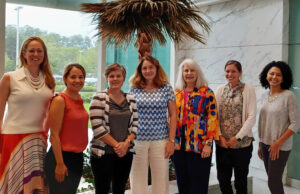
Diagnostic Radiology Qualifying (Core) Breast Committee From the Editor
New Year Brings Exciting Board Initiatives and Activities
By Mary S. Newell, MD, ABR Governor
February 2023;16(1):1
With 2023 upon us, I hope we all feel newly invigorated to pursue rewarding initiatives and interests, professional but personal as well! I plan to bake the perfect baguette this year, among other projects. In this issue of The Beam, we see there is activity aplenty at the ABR, with many exciting results.
In this issue …
- From the President: Balance in Certification Process, Better Service Among Areas of Emphasis for Board and Staff
- ABR President Robert Barr, MD, and Executive Director Brent Wagner, MD, MBA, detail the strategic priorities and areas of emphasis on which the ABR governing board and management team are focused, ensuring an important balance in the certification process, as well as enhanced service across the organization.
- From the Executive Director: Conference Provides Concrete Example of Certification’s Value
- Dr. Wagner very “concretely” makes note (after a fortuitous elevator conversation) that the ABR’s vital mission parallels that of other organizations tasked with certifying the quality and competence of their members for the benefit of all stakeholders.
- From the Board of Trustees: DEI Committee Taking on Unconsious Bias
- ABR Trustee PJ Rochon, MD, and Governor Toby Gordon, ScD, report on important and impending Diversity, Equity, and Inclusion Committee initiatives and impart some of their philosophical views on what next steps will look like for the group.
- Focus on DR: Aggregate Exam Results Report Allows Residency Review Committee to Evaluate Programs
- ABR Governor Donald Flemming, MD, and Psychometrician Brooke Houck, PhD, discuss the aggregate exam results report that the ABR provides to residency programs for all initial certification exams.
- Focus on IR: ABR Changes Interventional Radiology Oral Exam Timing
- Associate Executive Director for Interventional Radiology Jim Spies, MD, summarizes important upcoming changes to the timing of the IR Oral Certifying Exam and recounts the motivating factors behind the modification.
- Focus on MP: New Categories for the Oral Certifying Exam
- ABR Trustees Kalpana Kanal, PhD, Matthew Podgorsak, PhD, and Robert Pooley, PhD, along with MP Associate Executive Director Geoff Ibbott, PhD, describe the new category structure to be used for the Diagnostic Medical Physics Oral Certifying Exam and outline the impetus for making the change.
- Focus on RO: A Tribute to Dr. Paul Wallner
- In “A Tribute to Dr. Paul Wallner,” ABR Trustees Andrea Ng, Brian Davis, and John Suh and Governor Kaled Alektiar honor a wonderful colleague, who will be stepping down from his position as RO Associate Executive Director this spring, and highlight his amazing career with the ABR and beyond.
- New Perspectives: Visiting Scholar Seeking Feedback on Continuing Certification
- Sara Hunter, MD, the inaugural ABR awardee of the American Board of Medical Specialties Visiting Scholar program, updates us on her ongoing project and invites reader feedback about how Online Longitudinal Assessment (OLA) might be improved.
- ABR Staff Spotlight: Often Tested, Exam Day Help Desk Has the Answers
- ABR Communications Coordinator Heather Hopkins reports on the proactive approach ABR Help Desk members take on exam day, how the job has evolved, and how continuous improvement is the name of the game for this group.
- Announcements: DR Trustee Named Fellow of the Society of Breast Imaging
- Pam Propeck, MD, is honored as a new Fellow of the Society of Breast Imaging.
- Announcements: Dr. Mimi Newell Named New DR Associate Executive Director
- Mary S. (Mimi) Newell, MD, is selected as the new ABR Associate Executive Director for Diagnostic Radiology.
- From the President: Balance in Certification Process, Better Service Among Areas of Emphasis for Board and Staff
-
December 2022

Young brown bears in Alaska photographed by ABR volunteer Jennifer Bellon, MD. See the Volunteer Spotlight for more about this radiation oncologist’s adventures as a wildlife photographer. -
October 2022
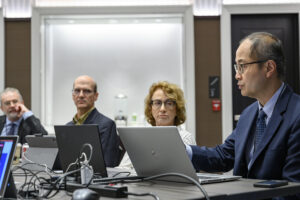
ABR fall board meeting in Boston, September 2022 From the Editor
New Beginnings
By Mary S. Newell, MD, ABR Governor
October 2022;15(5):1
I love fall with its smell of castoff leaves, cooler days sprinkled with an occasional glorious, azure-skied summer leftover, and the sense of renewal and new possibilities it holds. This fall brings specific change for me as I become the editor of The Beam. While honored and grateful for the opportunity, I admit to some trepidation, as my predecessor, Dr. Anthony Siebert, is a really hard act to follow. In his four years as editor, Tony shepherded The Beam through a period of expansion and refinement, carried out with his usual integrity, organizational expertise, and sense of humor, which he brings to all endeavors. Fortunately, highly skilled ABR staff members will be here to help me carry on Tony’s excellent work.
In this issue …
- From the President: ABR Board of Governors Prioritizes Communication and Prudent Financial Management
- ABR President Robert Barr, MD, and Executive Director Brent Wagner, MD, discuss communication and financial management as Board priorities.
- From the Executive Director: Listening and Learning Improve ABR Customer Service
- Dr. Wagner teams with ABR Certification Services Division (CSD) Manager Kinsey SmithWright to expound the value of listening and learning from stakeholder feedback to improve customer service.
- From the Board of Governors: ABR Board of Governors Seeks Qualified Applicants
- Dr. Barr and President-elect Cheri Canon, MD, announce a call for applicants to serve on the ABR Board of Governors and detail the necessary qualifications.
- From the Board of Trustees: Criterion-Referenced Scoring Compares Performance to a Standard
- ABR Psychometrician Brooke Houck explains how criterion-referenced scoring, the method used to score all ABR computer-based exams, differs from norm-referenced scoring.
- Focus on DR and IR/DR: Recognized Focused Practice in Endovascular Neurosurgery
- Drs. Radvany, Pride, and Derdeyn review a Recognized Focused Practice (RFP) opportunity in CNS endovascular surgery for diplomates in diagnostic radiology or interventional radiology.
- Focus on MP: ABR Nuclear Medical Physics Certifying Exam Committee
- ABR Associate Executive Director for Medical Physics Geoffrey Ibbott, PhD, and the MP trustees introduce the Nuclear Medical Physics Certifying Exam Committee and describe their responsibilities.
- Focus on RO: ABR Reaches Stakeholders Through Meetings, Publications, and Open Communication
- ABR Associate Executive Director Paul Wallner, DO; Director of Communications David Laszakovits; and Director of Exam Services Anthony Gerdeman discuss how the ABR meets two important elements of our responsibility to stakeholders: transparency and availability.
- New Perspectives: Future Radiology Residents Use Hashtags to #Connect
- ABR Communications Manager Rodney Campbell describes how radiology residents are using hashtags on social media to build community.
- ABR Staff Spotlight: Project Management Team Makes Collaboration a Priority
- We shine a light on the ABR project management division, a small team that has played a big role in helping other departments tackle the myriad changes of the past few years.
- Continuing Certification Update: OLA Questions Go Through Extensive Development and Review
- Rodney Campbell reviews how questions are generated for Online Longitudinal Assessment and talks to four volunteers about their experiences on OLA question-writing committees.
- Announcements: ABR Selects First ABMS Visiting Scholar
- Sara Hunter, MD, is the first ABR-sponsored researcher in the ABMS Visiting Scholars Program.
- News: Administrative Changes to Medical Physics Part 1 Qualifying Exam Benefit Candidates
- Changes in the scoring and administration of the Medical Physics Part 1 Qualifying Exam are explained.
- From the President: ABR Board of Governors Prioritizes Communication and Prudent Financial Management
-
August 2022
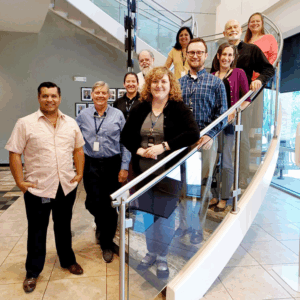
Volunteers on the Oral Exam Diagnostic Medical Physics Committee traveled to Tucson for an in-person meeting at ABR headquarters in May 2022. From the Editor
Fall Board Meeting Brings Transitions, Including Beam Editor
By J. Anthony Seibert, PhD, ABR Governor
August 2022;15(4):1
We are approaching the fall meeting of the American Board of Radiology, which marks the beginning and ending appointments for volunteers serving on the Board of Governors (BOG) and the Board of Trustees (BOT). This year’s meeting is particularly relevant for me, as I am ending my time as a board member and as editor of The Beam. My participation as a volunteer for the ABR began in 1994, when I was an item writer for the Part 2 Certifying Exam in Diagnostic Medical Physics (DMP), and continued through many different committees, exam assembly meetings, and oral exams over nearly three decades. In 2013, I was selected as a trustee with the DMP portfolio and served in that capacity for four years. In the middle of my first term, the Board split into the BOT and BOG, and in 2017, I was asked to join the BOG to fill the spot vacated by Geoff Ibbott, now our associate executive director (AED) for medical physics.
At the same time, I was also asked to become editor of The Beam, as trustee and editor Lane Donnelly rotated off the Board. Initially feeling a bit overwhelmed, I was welcomed by ABR communications staff and greatly assisted in getting up to speed. Many changes were implemented over the first year, including converting from three issues per year to six, and ultimately establishing the “Beam team” consisting of myself, Heather Hopkins, David Short, David Laszakovits, Rodney Campbell, and Brent Wagner. It is now with great confidence that I turn over the editorship of The Beam to my friend and colleague on the BOG, Mimi Newell. She has a great perspective on the ABR through her time on the BOT and BOG and is currently serving on the American Board of Medical Specialties Committee on Continuing Certification. Her insights and creativity will provide a different perspective on content in The Beam, while still providing the readership important news, guidance, and directives of the ABR, in addition to timely announcements – a great reason for you to look forward to each future publication. I certainly will be!
In this issue …
- From the President: Serving as ABR Board President a Highlight of Career
- ABR President Vince Mathews, MD, reminisces about his long-term volunteer commitment to the ABR and his two-year term as president, which ends at the completion of the ABR fall bord meeting in September.
- From the Executive Director: ABR Seeks Stakeholder Input on DR Initial Certification Process
- ABR Trustee Desiree Morgan, MD, and ABR Executive Director Brent Wagner, MD, MBA, describe progress on the call for stakeholder comments regarding diagnostic radiology initial certification, seeking feedback on the DR Qualifying (Core) and Certifying exams.
- From the Board of Governors: President-elect Describes BOG Duties
- ABR President-elect Bob Barr discusses the duties of BOG members in a YouTube video
- From the Board of Trustees: Unique Role Bridging Two Boards Brought Challenges and Rewards
- ABR Governor Donald J. Flemming, MD, looks back at his time as chair of the BOT and describes its unique position in ABR governance as the bridge between the BOT and BOG.
- Focus on DR: Process Ensures that ABR Gets Qualified Volunteers
- ABR Associate Executive Director for Radiation Oncology Reed Dunnick, MD, reviews the process of selecting ABR volunteers.
- Focus on IR/DR: There’s Value in Attending Annual Conferences
- Interventional radiology resident Shelby Franz, MD, shares her experiences attending professional conferences and courses and described the rewards that are gained during training.
- Focus on MP: ABMS and ACGME: Six Core Competencies for Initial Certification
- ABR Trustee Kalpana Kanal, PhD, and colleagues review the ABMS/ACGME six core competencies for Initial Certification and provide specific MP examples of activities meeting the standards.
- Focus on RO: Content Development for Radiation Oncology Qualifying and Certifying Exams
- Paul Wallner, MD, ABR associate executive director for radiation oncology; Brian Davis, mD, ABR Trustee for radiation oncology, and Anthony Gerdeman, PhD, ABR director of exam services discuss the methodology for determining content for items and new content development for Radiation Oncology Qualifying and Certifying exams.
- New Perspectives: ABR Residency Leave Policy an Experience-Changer for Trainees
- ABR diplomates Christine Cooley, MD, and Carolynn DeBenedictus, MD, evaluate the initiation of the ABR Residency Leave Policy and highlight the flexibility provided to residents and program directors through recent personal testimonials.
- Volunteer Spotlight: Being an ABR Volunteer Helps Program Director Better Understand Candidate Experience
- ABR Communications Manager Rodney Campbell interviews Drew Caplin, MD, an interventional radiology program director, regarding his experience as an ABR volunteer and his view of the processes involved in Qualifying (Core) and Certifying (Oral) exams.
- Continuing Certification Update: OLA Tips and Reminders for 2022
- Timely advice is included for those participating in OLA and working toward their annual progress requirement.
- Announcements: Medical Physicist to Lead Board of Trustees
- ABR Senior Medical Physics Trustee Matthew B. Podgorsak, PhD, will replace Donald J. Flemming, MD, as chair of the ABR Board of Trustees (BOT) at the annual Board meeting in September.
- From the President: Serving as ABR Board President a Highlight of Career
-
June 2022

Kamyar Ghabili, MD; Jared Pasetsky, MD; Simone Raiter, MD; Emily Thompson, PhD; and Emily Van Antwerp, MD, are new residents in radiology, medical physics, or radiation oncology. Read their stories below in this month’s New Perspectives. From the Editor
ABR Evaluates Processes, Policies, and Procedures to Improve Certification Experience
By J. Anthony Seibert, PhD, ABR Governor
June 2022;15(3):1
Welcome to the mid-year 2022 publication of The Beam. The American Board of Radiology is continually evaluating processes, policies, and procedures to improve the flexibility, quality, efficiency, and value of ABR certification for its candidates and diplomates. Many of the articles in this edition describe modifications, updates, or initiatives to achieve these goals.
In this issue …
- From the President: ABR Will Cease Issuing Authorized User-Eligibility Designation After 2023
- Vince Mathews announces the decision of the Board of Governors to sunset the Authorized User-Eligibility (AU-E) status on the ABR certificate by the end of 2023. He explains the rationale for doing so and indicates the re-direction of currently allocated resources to exam improvement. (For more on this topic, see Focus on RO.
- From the Executive Director: Continuing Certification Modifications Improve Learning and Assessment Processes
- Brent Wagner discusses the American Board of Medical Specialties’ modifications to the Continuing Certification Standards to be enacted in January 2024 by its Member Boards, and how the ABR is fortunately situated by the proactive efforts it took in 2019 with the initiation of the Online Longitudinal Assessment (OLA) program, improvement of the continuing medical education requirements by offering greater flexibility to diplomates, and expansion of the Part 4 “Improvement in Medical Practice” by adding peer learning to the suite of acceptable activities meeting these requirements.
- From the Board of Governors: Board Certification Serves Physicians and Patients
- President-Elect Robert Barr remarks on the board certification process and establishing value through the availability of a transparent, rigorous credential recognized by payers, colleagues, and the public.
- From the Board of Trustees: Volunteer Task Force Addresses Image Quality Challenges
- Stephen Simoneaux, Trustee for Pediatric Radiology, is the chair of the Image Quality Task Force with a charge to address the quality of images used in ABR exams. He describes the recent efforts by the task force to understand legacy processes, to develop instructions for procuring images, to ensure exclusion of protected health information, and to develop training modules for volunteer exam writers to ensure consistent, high image quality on all exams.
- Focus on DR: Technology Enables New Exam Creation and Delivery
- Associate Executive Director for Diagnostic Radiology Reed Dunnick reviews the role of technology in radiology over the years, and how advances in technology enable the ABR to create credible exams for initial and subspecialty certification, as well as Continuing Certification to save time and expense for candidates and diplomates.
- Focus on IR/DR: Tiptoeing Back to Normal?
- Jim Spies, Associate Executive Director for Interventional Radiology, talks about the impact of the COVID pandemic requiring the adoption of Webex and Zoom for remote exams and volunteer meetings, but with the expectation of a gradual return to in-person interactions in the coming months for ABR volunteer activities.
- Focus on MP: MP Oral Examiner Training and Engagement
- Matthew Podgorsak, Senior Medical Physics Trustee, and colleagues describe the process involved in identifying, engaging, training, and assessing volunteer oral examiners for the medical physics certification exam.
- Focus on RO: Authorized User-Eligibility: Changes Afoot in the Designation
- Paul Wallner, Associate Executive Director for Radiation Oncology, and David Laszakovits, Director of Communications, provide more details regarding the the sunsetting of the AU-E designation for radiation oncologists.
- New Perspectives: New Residents Ready to Take Next Steps in Their Careers
- Rodney Campbell, ABR Communications Manager, interviews new residents and future ABR candidates and diplomates in all of the ABR disciplines, providing insight on how these individuals view their future.
- Continuing Certification Update: OLA Email Preferences Offer Options
- Diplomates can set the frequency with which they receive OLA emails.
- News: ABR Introduces Scoring Progress Bar for Computer-Based Exams
- The ABR announces the introduction of the scoring progress bar for computer-based exams.
- Announcements: ABR Associate Executive Director Receives 2022 SIR Leaders in Innovation Award
- We are pleased to learn of the Society of Interventional Radiology “Leaders in Innovation” award to our own Jim Spies for his innovation as a practicing interventional radiologist.
- Announcements: Trustee Elected to ASNR Nominating Committee
- ABR Trustee Christopher Wood, MD, has been elected to the ASNR Nominating Committee.
- From the President: ABR Will Cease Issuing Authorized User-Eligibility Designation After 2023
-
April 2022
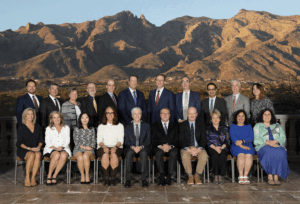
ABR Board, February 2022 From the Editor
ABR Welcomes Feedback to Improve Services to Candidates and Diplomates
By J. Anthony Seibert, PhD, ABR Governor
April 2022;15(2):1
Welcome to the spring edition of The Beam. In this issue …
- From the President: Town Hall on Continuing Certification Addresses OLA Content and Potential Future Enhancements
- ABR President Vincent P. Mathews, MD, reports on the ABR Town Halls held in late February, where individual meetings for all four specialties provided a platform for candidates and diplomates to bring up issues and questions for discussion. As explained by Dr. Mathews, the feedback received will be used by the Board of Governors, the Board of Trustees, and ABR volunteers and staff to improve and streamline the Initial and Continuing Certification programs.
- From the Executive Director: Training Verification Form Now References Core Competencies
- ABR Executive Director Brent Wagner, MD, MBA, explains modifications to the training verification form for teaching programs and program directors across the four disciplines certified by the ABR and describes the rationale for institutions being responsible for confirming satisfactory achievement in areas of practice beyond the scope of a standardized exam.
- From the Board of Governors: ABR Board of Governors Supports Culture of Excellence
- Dr. Wagner discusses initiatives he and the ABR staff presented to the BOG during the winter Board meetings to address needed updates, improve transparency, and increase efficiency for processes that directly support our candidates and diplomates.
- Focus on DR: DR Diplomates Take Advantage of New OLA Practice Profile Options
- ABR Associate Executive Director for Diagnostic Radiology N. Reed Dunnick, MD, explains the rules, which began in January, that give DR diplomates more options in configuring their practice profiles for Online Longitudinal Assessment (OLA).
- Focus in IR: New OLA Practice Profile Options Are Popular with IR Diplomates
- Similar updates are discussed by Jim Spies, Associate Executive Director for Interventional Radiology, for IR diplomates.
- Focus on MP: What Constitutes “Walking-Around Knowledge” for Medical Physics OLA Questions?
- Continuing the theme of OLA, Medical Physics Trustees Matt Podgorsak, Kalpana Kanal, and Bob Pooley, and Associate Executive Director for Medical Physics Geoff Ibbott give an extensive overview of what constitutes “walking around knowledge” for medical physics OLA questions.
- Focus on RO: Radiation Oncology Certifying Exam Development and Administration
- ABR Associate Executive Director for Radiation Oncology Paul Wallner, DO, and ABR Trustee Brian J. Davis, MD, PhD discuss the structure, process, and administration of the Radiation Oncology Certifying Exam.
- New Perspectives: What the ABR Has Taught Me About Healthcare Quality
- ABR Governor Toby Gordon, ScD, discusses her perspectives on the healthcare system and how quality oversight depends on the work done by professional nonprofit medical organizations, including the ABR.
- ABR Staff Spotlight: Pandemic Changes ABR Human Resources’ World
- ABR Communications Manager Rodney Campbell interviews Managing Director Karyn Howard and Human Resources Manager Brooke Smith about the challenges the COVID-19 pandemic has wrought on recruiting for and maintaining staff levels necessary to fulfill the ABR’s mission, and some of the solutions that have evolved over the past two years.
- News: ABR Moves the Annual Medical Physics Part 1 Qualifying Exam to August, Beginning in 2023
- For information about the Medical Physics Part 1 Qualifying Exam annual delivery date moving to August 2023 after the January 2023 exam.
- From the President: Town Hall on Continuing Certification Addresses OLA Content and Potential Future Enhancements
-
February 2022

From the Editor
ABR Well Positioned to Handle Further COVID Disruptions
By J. Anthony Seibert, PhD, ABR Governor
February 2022;15(1):1
A new year is upon us – and sigh – so is the appearance and rapid spread of the highly contagious omicron COVID variant. Fortunately, the ABR is positioned to continue operations without impacting Initial Certification written and oral exam schedules because of the remote exam capabilities we implemented in early 2021 in response to the first appearance of the virus and the disruption it caused in 2020. We can thank the development of Online Longitudinal Assessment (OLA) several years ago for providing the infrastructure needed to build the initial remote exam platform. Many improvements in the design and delivery of remote exams will be introduced by the ABR staff over the coming year based on feedback from candidates and examiners. Along the way, updates and news will be reported in The Beam.
In this issue …
- From the President: Improving Communication Through Town Halls and Surveys
- Vince Mathews discusses the importance of communication with ABR stakeholders and announces two initiatives directed at improvements: a communications survey and open “town hall” sessions that will allow candidates and diplomates a direct conduit to the ABR governors, trustees, volunteers, and staff. In a companion article, Executive Director Brent Wagner highlights a recent report by an outside consultant regarding external stakeholder perceptions of the ABR, which provided directives for improving board functions and responsiveness in support of candidates and diplomates.
- From the Board of Governors: ABR Governor Ready to Contribute on ABMS Continuing Certification Committee
- Mimi Newell describes her involvement in the American Board of Medical Specialties (ABMS) Continuing Certification Committee, how examples of best practices among Member Boards can be used to improve ABR processes, and the value of volunteering for the ABMS and the ABR.
- Focus on DR: Improved Exam Prep Tool Will Allow Candidates Greater Access to Explore Remote Platform
- Reed Dunnick, ABR Associate Executive Director for Diagnostic Radiology, describes the soon-to-be implemented “Exam Readiness Check” that will assist DR candidates in evaluating their computer system technical capabilities and “Sample Questions” that will allow more practice with the software and imaging tools.
- Focus on MP: ABR Trustees Find Tremendous Value in Post-Exam Surveys
- Matthew B. Podgorsak, PhD, senior ABR Trustee for Medical Physics, and colleagues review 2021 post-exam survey responses, which will inform the continuing evolution and improvement of exams.
- Focus on RO: ABR Responds to Radiation Oncology Questions
- Paul Wallner, DO, ABR Associate Executive Director for Radiation Oncology, and David Laszakovits, MBA, ABR Director for Communications, respond to RO candidates’ and diplomates’ questions regarding Continuing Certification, OLA, volunteering for the ABR, and the number of RO exam administrations in the coming year.
- New Perspectives: Radiology Is a Great Fit for Any Personality Type
- Myles Mowry, DO, a resident in interventional radiology, gives his viewpoint on the career opportunities that radiology provides for a span of personality traits, from introverts to extroverts, and everything in between.
- Diplomate Spotlight: MP Diplomate’s Dreams Taking Flight in Astronaut Training
- Christopher L. Williams, PhD, one of the new group of astronauts in training selected by NASA, talks about his journey from astrophysics to medical physics to a life-long dream of being an astronaut in a video interview by the Beam staff … and yes, he does plan on continuing participation in OLA from space!
- News: ABR Achieves Platinum Status for Fifth Straight Year
- The ABR has earned Platinum status (the highest level) for the fifth straight year from Candid Guidestar – a measure of a nonprofit organization’s transparency in communicating information about finances, operations, and programs.
- News: ASTRO, RSNA Annual Meeting Attendees Happy to Get Together Again
- With the resumption of annual meetings in the fall of 2021 by ASTRO and the RSNA, a few attendees offer their thoughts on the events and their optimism for a return to traditional get-togethers.
- Announcements: ABR Trustee Awarded SIR Gold Medal
- Congratulations are in order for ABR Trustee M. Victoria (Vicki) Marx who has been awarded the Society of Interventional Radiology (SIR) Gold Medal for 2022.
- From the President: Improving Communication Through Town Halls and Surveys
-
December 2021
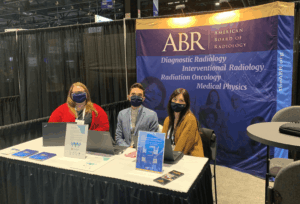
ABR staff ready to assist candidates and diplomates at the 2021 Radiological Society of North America (RSNA) meeting. From the Editor
As Busy Year Ends, We Look Forward to Continued Exam and OLA Improvements
By J. Anthony Seibert, PhD, ABR Governor
December 2021;14(6):1
The end of the year enables us to look back at the accomplishments of 2021 and forward to 2022 with renewed optimism of a “normal” ABR exam schedule and continued improvements in the exam process. Implementation of remote exam infrastructure was solidly underway last January, when we had the daunting mission of delivering twice the number of computer-based and oral exams for candidates who had missed the opportunity in 2020 because of the COVID pandemic and for those in 2021 who had a slightly delayed time frame. A very heavy lift indeed, particularly considering the work-at-home mandates of ABR staff, the unknown aspects of the remote exam platform, and the compressed time frame requirements.
Under the leadership of ABR Executive Director Brent Wagner, progress was made month by month, with the successful completion of the 2020 computer-based and oral exams by May 2021, and for the 2021 exams by the end of October. Throughout this effort, improvements for the exam delivery process were implemented using feedback from candidates, trustees, and ABR staff. While there were some disruptions to a small fraction of candidates because of connectivity and software issues, exam outcomes for all disciplines were validated with psychometric analysis and found to be reliable and consistent, comparable to exams from previous years. Many thanks to the ABR staff for their dedication and perseverance in achieving these amazing accomplishments.
In this issue …
- From the President: ABMS Releases New Continuing Certification Standards
- President Vince Mathews explains the American Board of Medical Specialties (ABMS) future standards for “Continuing Certification” and how the ABR has already implemented most of the updated requirements, including its Online Longitudinal Assessment (OLA) program.
- From the Executive Director: Board Meetings Focus on Fairness, Transparency, and Innovation
- Brent Wagner discusses directives from the ABR virtual fall board meetings that include refining the remote exam platform, working with established stakeholder advisory committees for all disciplines, and establishing a diversity, equity, and inclusion (DEI) committee.
- From the Board of Governors: ABR Ranks High in Organizational Transparency
- John Kaufman, ABR secretary-treasurer, and David Laszakovits, Director of Communications, highlight the financial transparency of the ABR and its participation in the GuideStar program.
- Focus on DR: New OLA Practice Profile Options Increase Flexibility for Diplomates
- Reed Dunnick, Associate Executive Director for Diagnostic Radiology (DR) describes OLA enhancements and improvements in practice profile flexibility for DR and IR diplomates to allow personalized refinements in the critical practice areas from which OLA questions will be presented, beginning in 2022.
- Focus on IR/DR: New OLA Practice Profile Options Increase Flexibility for IR Diplomates
- Jim Spies, Associate Executive Director of Interventional Radiology (IR), describe OLA enhancements and improvements in practice profile flexibility for DR and IR diplomates to allow personalized refinements in the critical practice areas from which OLA questions will be presented, beginning in 2022.
- Qualifying (Core) Exam Study Resources: New Qualifying (Core) Exam Study Resources Now Available on the ABR Website
- Don Flemming, ABR Board of Trustees Chair, and Trustee Desiree Morgan announce the availability of new Qualifying (Core) Exam study resources on the ABR website to help improve understanding of the exam’s scope.
- Focus on MP: OLA Questions for MP Participants Continually Being Improved
- Medical Physics Trustee Kalpana Kanal reflects on two years of OLA diplomate participation, and the process of data collection, review, and analysis for improvement of the medical physics OLA program in preparation for the coming year.
- Focus on RO: Radiation Oncology to Provide Additional Preparation Resources for Examinees
- ABR Trustee Brian Davis, Associate Executive Director for Radiation Oncology Paul Wallner, and Director of Exam Services Anthony Gerdeman describe coming improvements in exam preparation resources that will allow examinees to attain a level of comfort with relevant question types and the navigation of exam controls in a realistic pre-test environment.
- New Perspectives: RO IC Advisory Committee Member Appreciates Opportunity to Provide Resident Perspective
- Rodney Campbell, ABR Communications Manager, converses with Shauna Campbell, DO, a member of the Radiation Oncology Initial Certification Advisory Committee, who provides her perspective as a former resident about the opportunities that participation in the advisory committee provides, including that collaboration and being a voice for residents is so important in the ongoing improvement and evolution of the initial certification process.
- New Perspectives: Remote Exam Advice for Several Who Succeeded
- In an associated article, Rodney interviews several candidates who provide tips and advice on how to prepare for initial certifying exams, with links to available ABR “how-to” video resources to help candidates prepare for a positive exam-day experience.
- ABR Staff Spotlight: Communications Team Employs Multipronged Approach to Inform ABR Stakeholders
- We review the global ABR communications efforts, with a focus on The Beam and the individuals responsible for coordinating, collecting, editing, and assembling articles for the newsletter.
- Continuing Certification: More Than 90% of OLA Participants Are Meeting Annual Requirements
- As the end of the year approaches, OLA participation is explained, as well as important reminders for annual requirements. For those taking a break, the restart of the OLA questions begins in January 2022.
- From the President: ABMS Releases New Continuing Certification Standards
-
October 2021
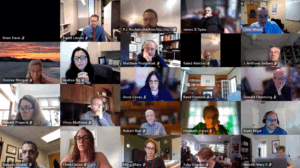
The Joint Session of the ABR Board of Governors (BOG) and Board of Trustees (BOT) at the 2021 fall annual meeting – again held remotely due to the rebound of COVID and the highly contagious delta variant. A summary of decisions and directives by the BOG and BOT will be detailed in our December issue. From the Editor
We’re Falling Into the Season with a Lot of News
By J. Anthony Seibert, PhD, ABR Governor
October 2021;14(5):1
We hope you enjoy this edition of The Beam, and we look forward to delivering you more in December. As always, I and the Beam staff welcome your comments and suggestions. Please contact us at communications@theabr.org. Happy fall season!
In this issue …
- From the President: ABR Executive Leadership Reduces Fees While Maintaining Needed Infrastructure
- President Vince Mathews discusses the vigilance of the Board of Governors and administrative executive staff in keeping fees to candidates and diplomates as low as possible and identifies examples of reductions implemented over the past four years, in addition to others beginning in 2022.
- From the Board of Trustees: New Handbook Better Serves Our Volunteers
- Volunteerism Committee Chair Elizabeth Oates and Associate Executive Director for Radiation Oncology Paul Wallner recognize the critical role of volunteers in support of the ABR mission, discuss the development of cross-discipline policies and procedures, and announce the availability of the new Volunteer Handbook to facilitate communication with current and future ABR volunteers.
- Focus on DR: Take This Advice: Choose a Physician Who’s Board Certified
- In the discipline sections, Associate Executive Director for Diagnostic Radiology Reed Dunnick discusses the value of ABR certification as an important measure of the quality of a healthcare professional.
- Focus on MP: August Administration Completes Busy Year for IC Exams
- The medical physics trustees present their views of the oral exam experience from the initial pilots to the most recent exams in August, the improvements made along the way, and new processes planned for certification exams in 2022.
- Focus on RO: Testing, Pilots Set the Stage for Remote Exam Success in 2021
- The radiation oncology trustees present their views of the oral exam experience from the initial pilots to the most recent exams in September (RO), the improvements made along the way, and new processes planned for certification exams in 2022.
- New Perspectives: From First Glance, He Knew He Loved Radiology
- Medical student Deven Champaneri shares his aspirations as a diagnostic radiology resident and future radiologist, and explains why he is attracted to radiology as a career.
- Volunteer Spotlight: Original Member of MP Advisory Committee Still Happy to Lend a Hand
- The Volunteer Spotlight shines on Samantha Simiele, PhD, an original member of the Medical Physics Initial Certification Advisory Committee. She joined the committee as an ABR candidate and continues to interact from her perspective as an ABR diplomate and assistant professor at the University of Texas MD Anderson Cancer Center to provide direction and feedback to the ABR in improving the certification process.
- Continuing Certification Update: Lifetime Certificate Holder Uses Continuing Certification to Stay on top of His Game
- Our “OLA Update” section has been renamed “Continuing Certification Update” to reflect a broader look at the process. In this issue, Mike Ulissey, MD, a lifetime ABR certificate holder in diagnostic radiology, gives his take on voluntarily participating in Continuing Certification as an obligation to professionalism and keeping up to date with the ever-evolving field of radiology, in a conversation with Communications Manager Rodney Campbell.
- News: ABR YouTube Channel a Great Way to View the News
- Finally, for up-to-date information about ABR activities, check out the News section of The Beam for links to important videos on the ABR YouTube channel.
- From the President: ABR Executive Leadership Reduces Fees While Maintaining Needed Infrastructure
-
August 2021

From the Editor
Incorporating Feedback from Stakeholders Helps ABR Meet Mission
By J. Anthony Seibert, PhD, ABR Governor
August 2021;14(4):1
This issue of The Beam focuses on the ABR’s continuing efforts to improve bidirectional communication and solicit feedback from stakeholders and professional societies to develop, refine, and adjust policies and procedures to better meet the mission of the ABR: “to certify that our diplomates demonstrate the requisite knowledge, skill, and understanding of their disciplines to the benefit of patients.” We hope you enjoy this issue and wish you the best for the remainder of the summer. If you have comments regarding content or suggestions for future topics, please contact the staff at communications@theabr.org. See you again in October!
In this issue …
- From ABR Leadership: Remote Exam Retrospective: Balancing Flexibility with High Security Standards
- Executive Director Brent Wagner and President Vince Mathews describe the continuing improvement in the delivery of high-stakes remote exams, based on feedback from candidates as well as lessons learned from the process. The goal is to be able to offer these exams indefinitely, which requires a firm commitment to balancing flexibility and maintaining high security standards.
- From the Board of Governors: Input from Associations and Societies Crucial in Times of Rapid Change
- The importance of maintaining a close relationship with professional associations and societies during times of rapid change and unanticipated challenges is discussed by ABR Governor Cheri Canon and Director of Communications David Laszakovits. As the pandemic recedes, opportunities and interactions at upcoming scientific and educational meetings are planned to enhance and expand these relationships.
- Focus on IR/DR: Learning From Your Feedback on the IR/DR Certifying Oral Exam
- Jim Spies, associate executive director for interventional radiology/diagnostic radiology, writes about the complicated logistics for delivering the IR/DR oral exam and how feedback from examiners and candidates is used to refine the process.
- Focus on MP: Changes to the Eligibility Requirements and Schedule of the MP Part 1 Qualifying Exams
- Matt Podgorsak, senior Trustee, and colleagues describe the rationale for eligibility requirement updates for the Medical Physics Part 1 Qualifying Exam and a change in the exam delivery date to mid-January beginning in 2022.
- Focus on RO: Maintaining Relevance of Radiation Oncology Clinical Exams
- Paul Wallner, associate executive director for radiation oncology, and Anthony Gerdeman, director of exam delivery, review the process for determining the relevance of content for RO clinical exams and how we rely on candidate and diplomate feedback to address gaps in knowledge and refine exam blueprints as we develop continuing medical education programs.
- New Perspectives: Pre-Exam Resources, Easy-To-Use Platform Calm Candidates’ Nerves
- Rodney Campbell, communications manager, interviews two candidates regarding their experiences with the remote oral exam, and how pre-exam resources and the easy-to-use delivery platform helped calm their nerves.
- Spotlight on ABR Staff: Switch to Remote Exams Required ‘All Hands on Deck’ for Exam Delivery Team
- Heather Hopkins, communications coordinator, talks with the exam delivery team about how the switch from in-person to remote exams presented the opportunity to upgrade and streamline their processes.
- OLA Update: What Happens Next?
- Have you completed your annual OLA requirement? Options are provided for those who have finished their annual question requirement as well as for those who have not yet started answering questions.
- Announcements: ABR Volunteers Awarded Leadership Roles with ASTRO
- ABR volunteers have been awarded leadership roles with the American Society for Radiation Oncology – congratulations to all!
- News: Hybrid Work Plan Encourages Flexibility, Productivity for ABR Staff and Volunteers
- We highlight plans for a return to the office for staff and in-person meetings for volunteers that emphasize flexibility and personal preference whenever possible, with a likely hybrid work environment that will unfold in the coming months. Stay tuned!
- From ABR Leadership: Remote Exam Retrospective: Balancing Flexibility with High Security Standards
-
June 2021

From the Editor
With Monumental Task Accomplished, ABR Looks to the Future
by J. Anthony Seibert, PhD, ABR Governor
June 2021;14(3):1
“2020 is finally over” – a direct quote from a message sent by ABR Executive Director Brent Wagner to the Board of Governors after the final oral exam for radiation oncology was completed on May 19. In an accompanying note, he congratulated staff for being “resilient in spirit and imaginative in execution” when challenged in June 2020 to redirect their efforts to the delivery of remote computer-based and oral exams. Indeed, as you will read in this edition of The Beam, a truly monumental effort in the midst of the pandemic and mostly “at home” work was undertaken by staff to implement the infrastructure and software, devise procedures and protocols, organize a large number of ABR volunteers for training on the oral exam platform, and keep things on schedule – all within 11 months!
In this issue …
- From the President: ABR Continuing Certification Programs Designed to Meet ABMS Standards
- ABR President Vince Mathews discusses the ABMS Draft Standards for Continuing Certification and how the ABR programmatic offerings fit within these recommendations, particularly with the 2019 implementation of Online Longitudinal Assessment (OLA).
- From the Executive Director: Months of Development Led to Successful Oral Exam Administrations
- Dr. Wagner shares his insight into the process and how plans for future exams are shaping up.
- From the Board of Governors: ABR Residency Leave Policy: How We Got Here
- Cheri Canon reviews the nearly completed ABR residency leave policy, and the evolving process that has occurred through engagement with the many constituents and stakeholder groups who are directly affected. In this and the President article, the ABR’s commitment to enhanced communication and clarity of these processes is described.
- From the Board of Trustees: Volunteers Are Essential to the ABR’s Work
- Chair Don Flemming addresses the critical and essential importance of ABR volunteers and describes the new item-banking system that will provide an efficient and intuitive interface for volunteer item writers, replacing a less flexible, legacy system. Other initiatives to improve communication with ABR volunteers and volunteer applicants, and efforts to ensure diversity, equity, and inclusion for ABR committees and ABR leadership are discussed.
- Focus on IR/DR: Hard Work Delivers Success in the Remote Environment
- James Spies, ABR associate executive director for interventional radiology, describes the successful conversion to a remote exam platform for the IR/DR Oral Certifying Exam.
- Focus on MP: Teamwork Makes Remote Oral Exams Successful
- The medical physics Trustees, Governor, and Associate Executive Director explain how teamwork enabled the first administration of the MP Oral Certifying Exam on a remote platform.
- Focus on RO: Successful Oral Exam Development Required Teamwork, Quick Action
- ABR Associate Executive Director for Radiation Oncology Paul Wallner, along with Lydia Malis and Anthony Gerdeman from Exam Services, discuss the actions required to develop and implement the new remote exam platform for the RO Oral Certifying Exam.
- New Perspectives: First-Time Examiners Make Easy Move to Remote Platform
- ABR Communications Manager Rodney Campbell interviews new examiners for their impression of the platform and their perceptions of the candidates’ comfort during exam delivery.
- Volunteer Spotlight: Experienced Oral Examiners Quickly Find Comfort on New Platform
- ABR Communications Manager Rodney Campbell interviews experienced examiners for their impression of the platform and their perceptions of the candidates’ comfort during exam delivery.
- OLA Update: There’s Still Time to Stay on Pace with OLA
- Associate Executive Director for Diagnostic Radiology Reed Dunnick explains how diplomates who are enrolled in Continuing Certification but have not yet engaged in answering OLA items still have time to catch up – but that time is quickly running out.
- Announcements: ABR Trustee Receives 2021 AUR A3CR2 Outstanding Teacher Award
- Congratulations to ABR Trustee Sanjeev Bhalla, MD, for receiving the Association of University Radiologists 2021 A3CR2 Outstanding Teacher Award.
- From the President: ABR Continuing Certification Programs Designed to Meet ABMS Standards
-
April 2021
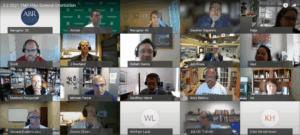
Screen capture from the Medical Physics (MP) Examiner Orientation Webinar prior to the MP Certifying Oral Exam Pilot. From the Editor
ABR Succeeds in Transforming Exams During COVID
By J. Anthony Seibert, PhD, ABR Governor
April 2021;14(2):1
Welcome to this edition of The Beam, where we celebrate the beginning of spring and a sense of light at the end of the COVID-19 tunnel. It has been a year of transformation for the ABR, pivoting in short order from in-person to remote exams for all specialties and exams, including qualifying and certifying computer-based and oral exams, all since the middle of June 2020. The monumental effort undertaken by the ABR staff under difficult conditions of stay-at-home directives and the urgency of putting in place the infrastructure, software, and logistics to deliver safe, secure, and reliable remote exams for candidates beginning in January 2021 has been a great achievement. The Board of Governors (BOG) and Board of Trustees (BOT) are extremely grateful for the leadership of ABR Executive Director Brent Wagner and to the associate executive directors, senior staff directors, and all ABR employees for their diligence, teamwork, and ability to cope with significant stress over the last nine months – their accomplishments and dedication are truly amazing.
The BOG and BOT convened remotely during the first week of March for the spring ABR retreat to conduct business and carry on the mission of the ABR: “to certify that our diplomates demonstrate the requisite knowledge, skill, and understanding of their disciplines to the benefit of patients.”
In this issue …
- From the President: Continuous Improvements to MOC Create a More Meaningful Continuing Certification Program
- Vince Mathews, ABR president and a participant in several American Board of Medical Specialties (ABMS) committees, describes efforts regarding the ABR Maintenance of Certification program and its evolution into the more meaningful Continuing Certification program as recommended by the ABMS Vision Initiative.
- From the Executive Director: Lessons Learned on Both Sides During First Remote Core Exam
- Brent Wagner discusses lessons learned by the candidates and staff from the first remote Core Exam as well as changes in the Core Exam scoring model for physics as decided by the BOG.
- From the Board of Governors: ABR Board Makes Decisions About Survey, Fees, and DEI
- A report from the BOG discusses three initiatives to support the mission on which they focused during the spring ABR retreat: a communications survey, a look at possible fee reductions, and an effort to expand diversity, equity, and inclusion opportunities.
- From the Board of Trustees: Pilot Exams Demonstrate Strength of Remote Oral Exam Platform
- Trustees Anne Covey, Brian Davis, and Matt Podgorsak describe the new remote oral exam software, changes to the candidate experience with the new platform, and the success of the three pilot certifying oral exams.
- Focus on DR: Candidate Feedback on Core Exam Is Positive
- Insights from participant responses to the Core Exam survey have been overall very positive, as explained by Reed Dunnick, associate executive director for diagnostic radiology, and Dr. Wagner. This is a positive step in the continued development and delivery of remote exams for the foreseeable future.
- New Perspectives: Candidates Impressed by New Remote Exam Platform
- On the receiving side of the remote Core Exam, two ABR candidates answer questions about their experiences.
- ABR Staff Spotlight: Experienced AEDs Fill Important Roles as Staff
- Rodney Campbell, ABR communications manager, discusses the important role of the associate executive directors (AEDs) in connecting ABR volunteers (BOG, BOT, and committee members) with staff and stakeholders (candidates, diplomates, and representative organizations). The AEDs’ long-term volunteer experiences with the ABR help them bring specific talents to assist the executive director in carrying out directives to fulfill the ABR’s mission.
- Announcements: ABR Trustee Recognized as 2021 ARRS Distinguished Educator, Joins RSNA Board
- ABR Trustee Sanjeev Bhalla is congratulated for two distinguished accomplishments: receiving the 2021 American Roentgen Ray Society (ARRS) Distinguished Educator Award and becoming a member of the Radiological Society of North America (RSNA) Board of Directors. Truly outstanding!
- From the President: Continuous Improvements to MOC Create a More Meaningful Continuing Certification Program
-
February 2021
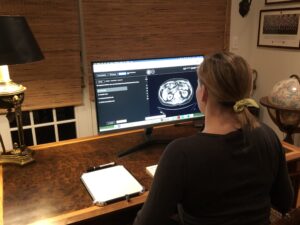
A candidate taking the practice exam. Photo courtesy of Frances Lazarow, MD. From the Editor
New Year Getting Off to Active Start
By J. Anthony Seibert, PhD, ABR Governor
February 2021;14(1):1
In this issue …
- From the President: Board Initiatives to Strengthen ABR in 2021
- President Vince Mathews discusses several Board of Governors’ initiatives intended to strengthen the ABR and provide support for candidates and diplomates during the transition to remote exams, as well as improve Online Longitudinal Assessment (OLA) and Continuing Certification through feedback and bidirectional communication with stakeholders. Initiatives for 2021 include working toward inclusion and diversity of ABR volunteers and staff and enhanced accountability for costs.
- From the Executive Director: ABR Creates New Exam Platforms to Meet Needs of Stakeholders
- Executive Director Brent Wagner provides an update on remote exam development and progress through a YouTube video that can be accessed here. The ABR has established a subscription-available YouTube channel that provides up-to-date information on recent developments of interest for candidates and diplomates.
- Spotlight on Finance: Board, Staff Working Together to Control Expenses
- Executive Director Brent Wagner and President Vince Mathews describe the efforts of ABR senior staff and leadership to control costs now and in the future.
- From the Board of Governors: Professionalism Is an Essential Element of Board Certification
- Cheri Canon, chair of the Ethics and Professionalism Committee, explains how professionalism is an essential element of board certification, and how the committee monitors and reviews issues reported by various entities for candidates, diplomates, ABR volunteers, and ABR staff.
- From the Board of Trustees: Examinees Provide Positive Feedback on First Remote Exam Administration
- Don Flemming, chair of the Board of Trustees, reviews feedback from the Diagnostic Radiology Certifying Pilot Exam delivered in January – largely a success – with discussion of how to improve the platform and delivery for upcoming remote exams.
- Focus on DR: OLA Review Process Improved Through Diplomate Comments
- Reed Dunnick, associate executive director for diagnostic radiology, is responsible for reviewing comments solicited from OLA participants; he provides examples of how feedback helps improve OLA delivery moving forward.
- Focus on IR/DR: IR/DR Remote Exams Are Underway
- Paul Rochon, ABR Trustee representing IR/DR, describes the steps taken to ensure candidates are prepared for the initial IR/DR remote Core Exam (delivery just completed over the first two weeks of February), the remote written certifying exam in April, and the remote oral certifying exam in May.
- Focus on MP: Medical Physics OLA Feature: Declining A Question
- Primary author Matt Podgorsak and colleagues from medical physics explain the question “decline” feature in OLA: what it does, what it doesn’t do, and how it may be used.
- Focus on RO: Radiation Oncology Remote Oral Exam Development
- Paul Wallner, Brian Davis, and Anthony Gerdeman elucidate the logistics involved in exam development, specifically focused on the delivery of the oral exam.
- New Perspectives: ABR Convenes Interventional Radiology Maintenance of Certification Advisory Committee
- Jim Spies, associate executive director for IR/DR, writes about the establishment of the IR/DR MOC Advisory Committee and its charge, focus, and purpose: soliciting important suggestions from committee members.
- Volunteer Spotlight: For Turkish Radiologist, Volunteering Provides Chance To Teach and Learn
- Hatice Savas, MD, describes her “less-traditional” path to ABR certification and her plans for using the volunteer position as an opportunity to stay up-to-date with her field of expertise.
- OLA Update: OLA Scores Well in Participant Survey
- Online Longitudinal Assessment (OLA) earns 4.1 out of 5 stars in a survey of 6,000 participants.
- Announcements: Former ABR Board Member Ready for Challenge as RSNA President
- Mary Mahoney, former ABR Trustee and Governor, is the 2021 President of the Radiological Society of North America. We wish her the best in her leadership role!
- Announcements: ABR Governor To Receive ACR Gold Medal
- We also express congratulations in advance to ABR Governor Cheri Canon as a Gold Medal recipient of the American College of Radiology, to be awarded at the annual meeting in May.
- From the President: Board Initiatives to Strengthen ABR in 2021
